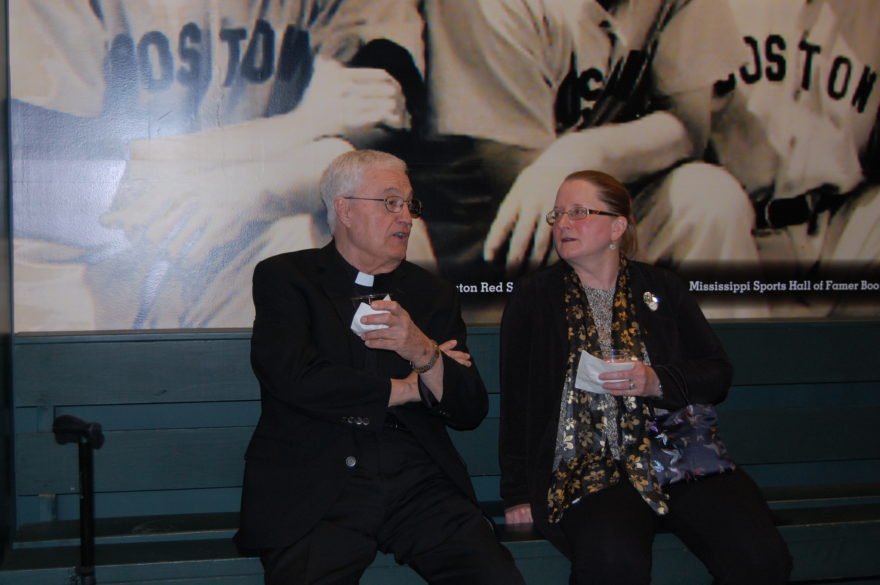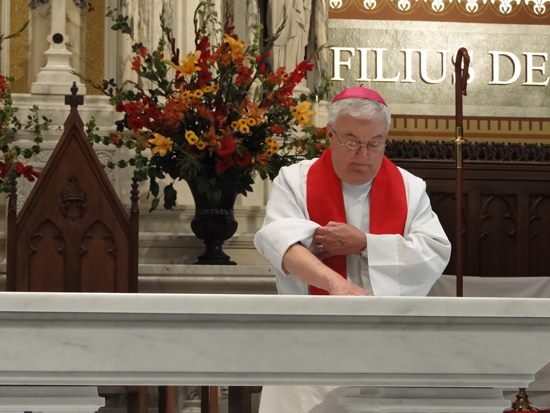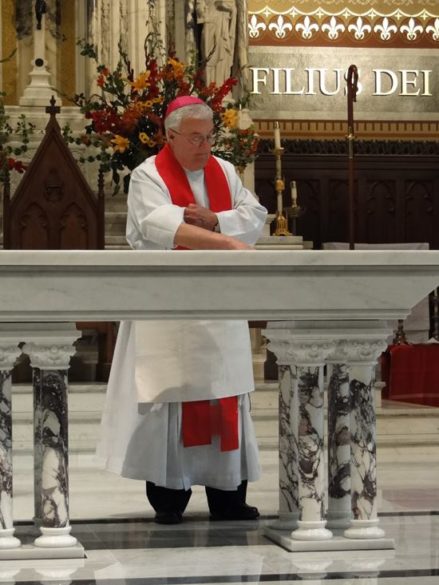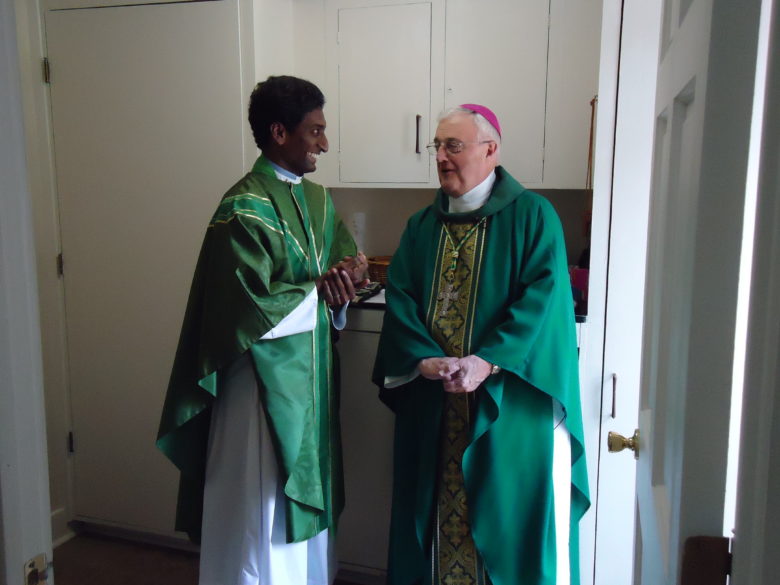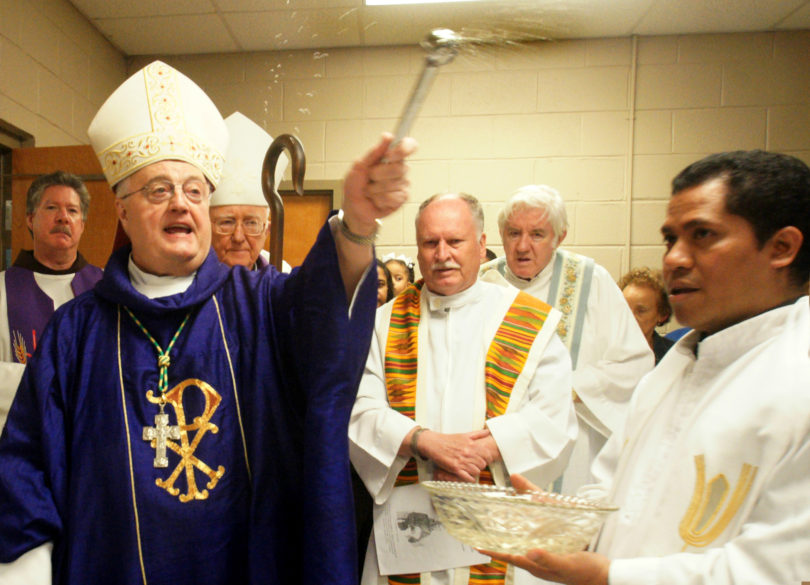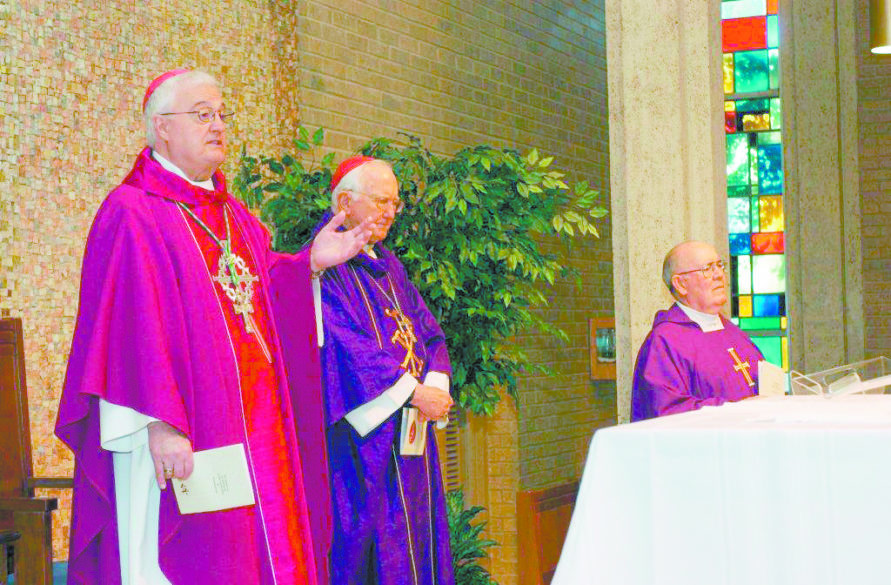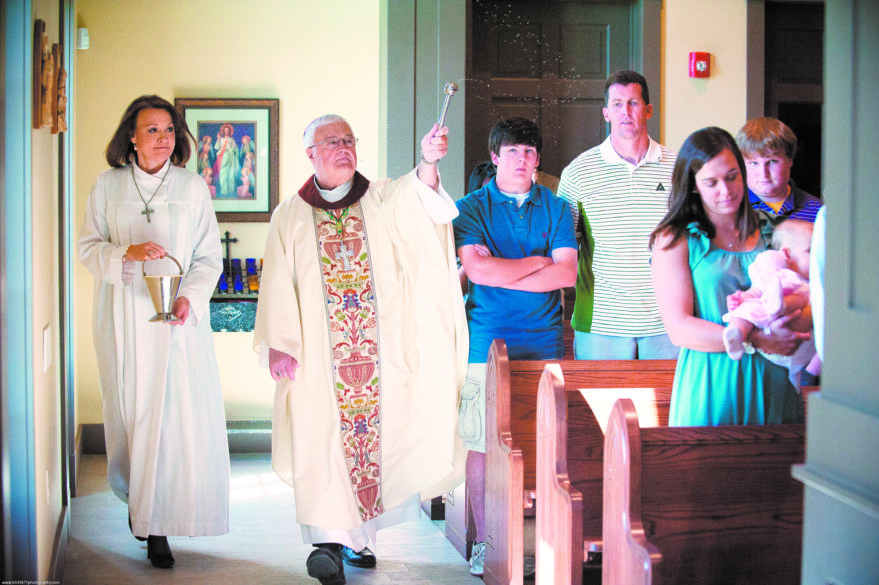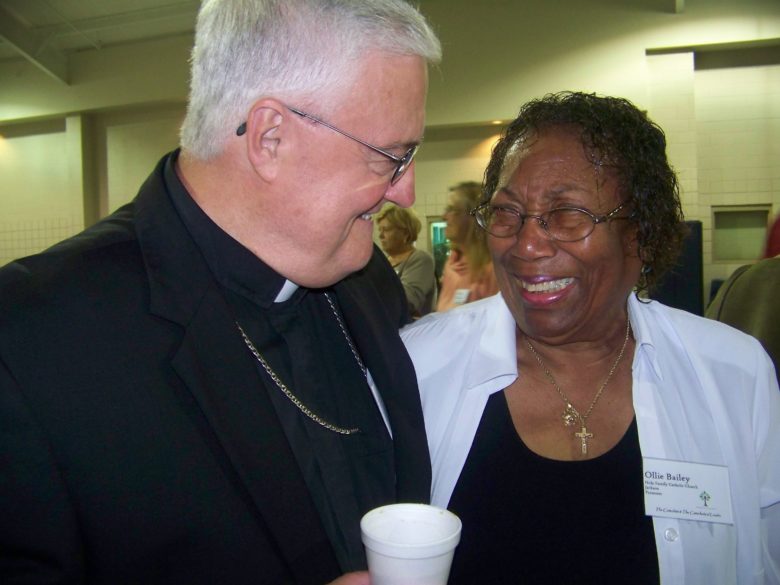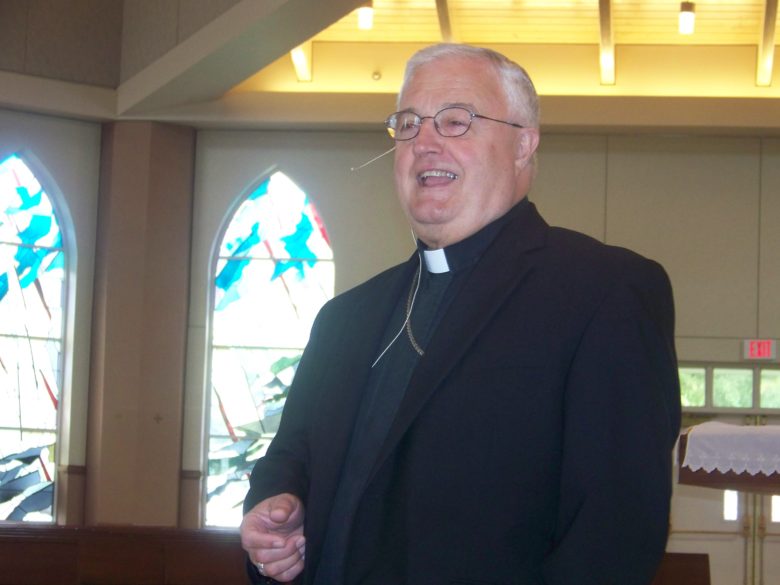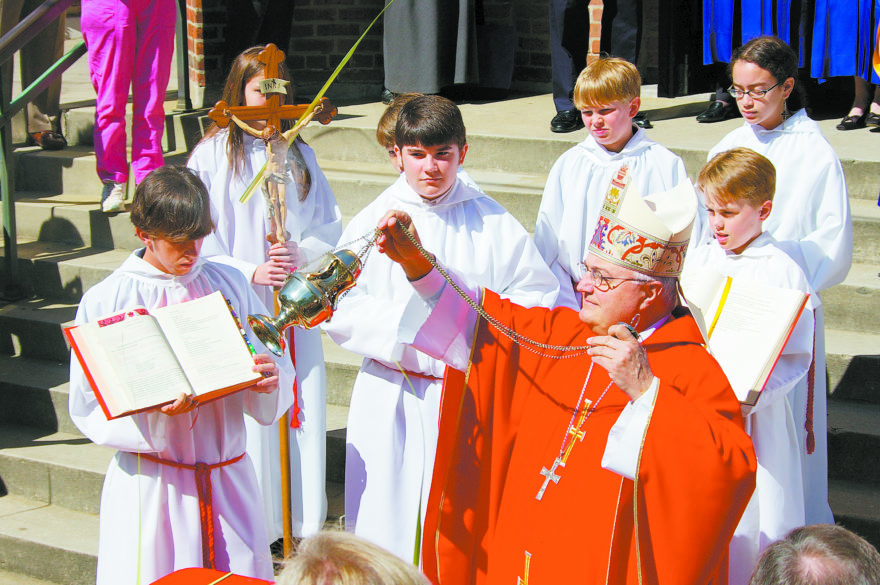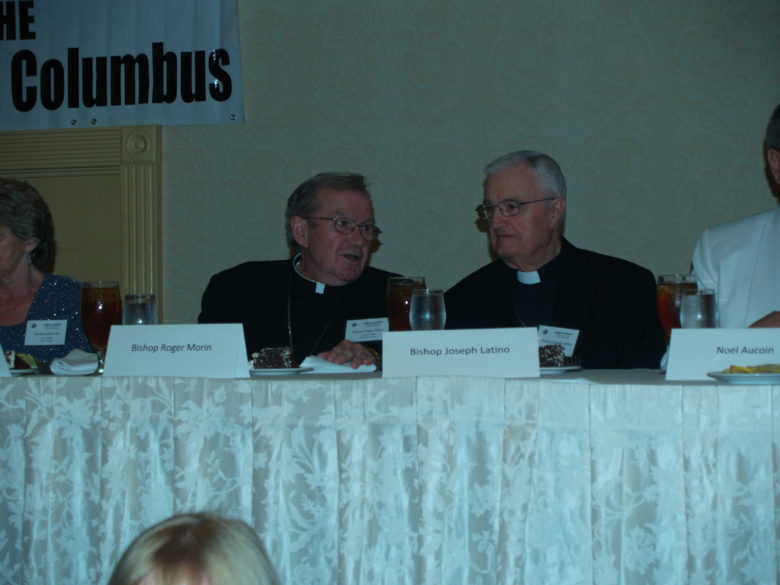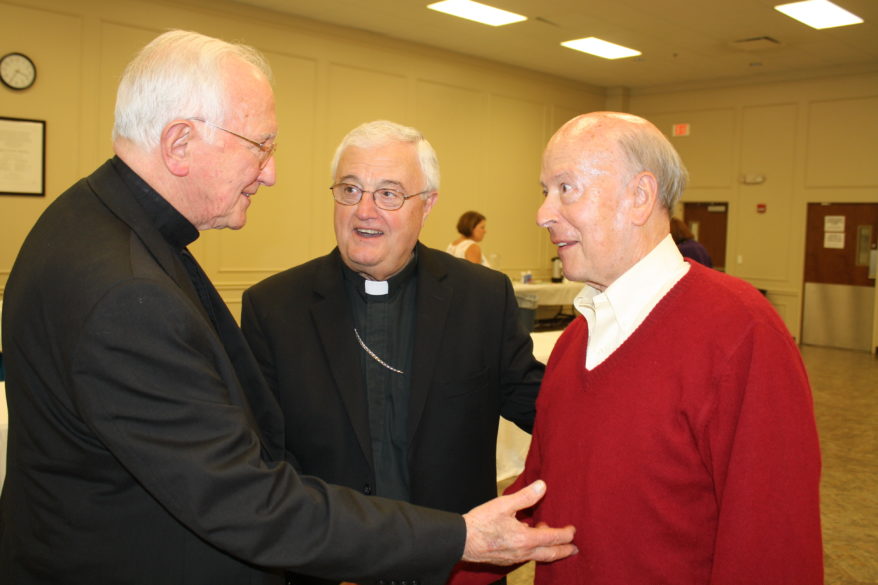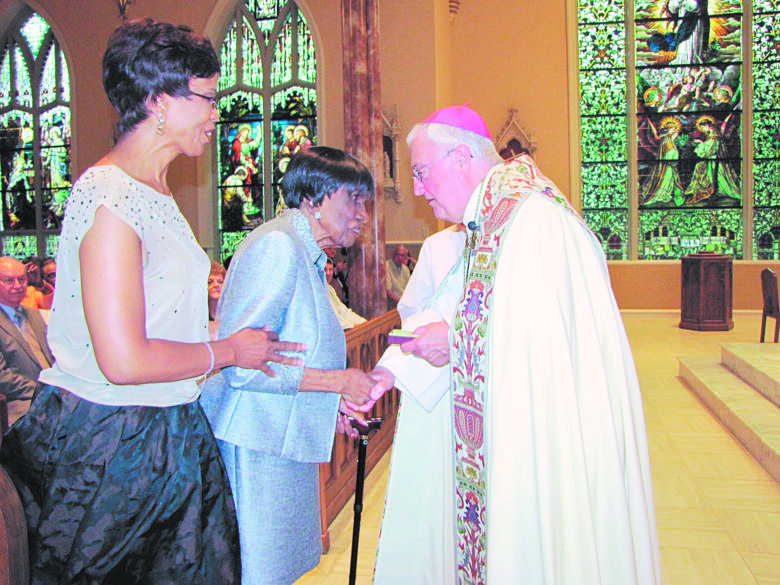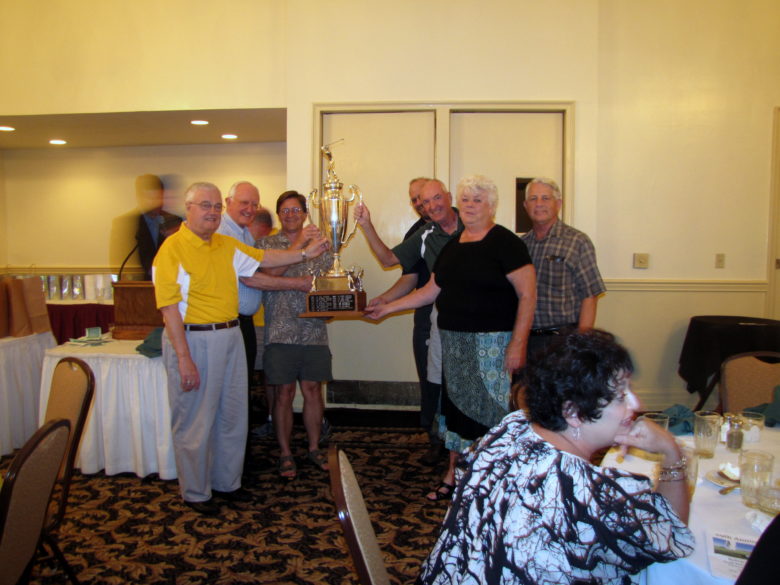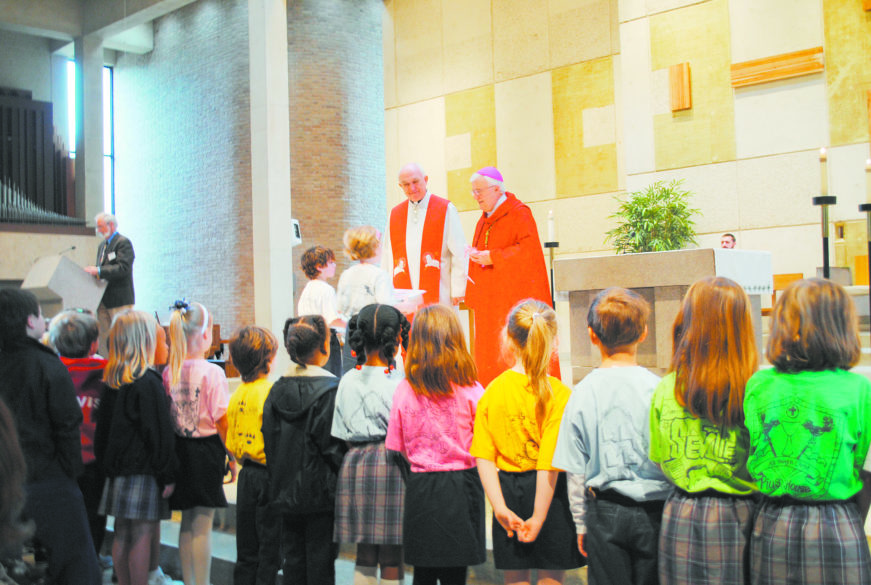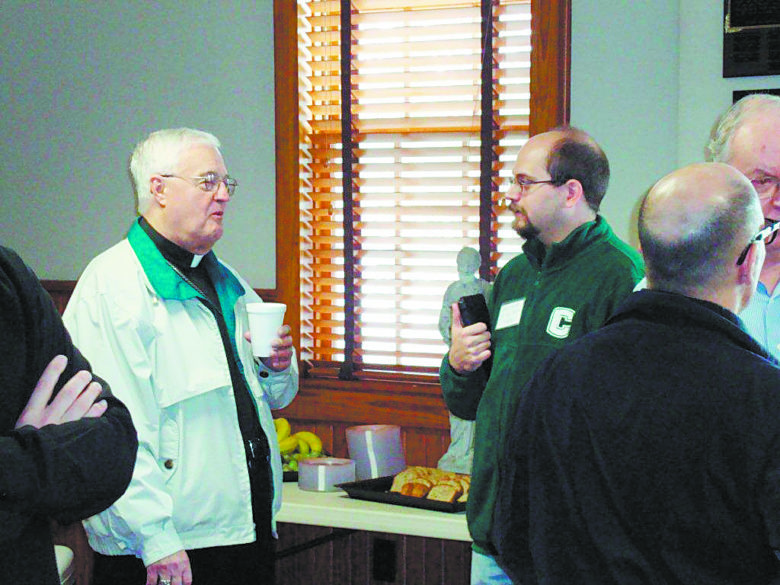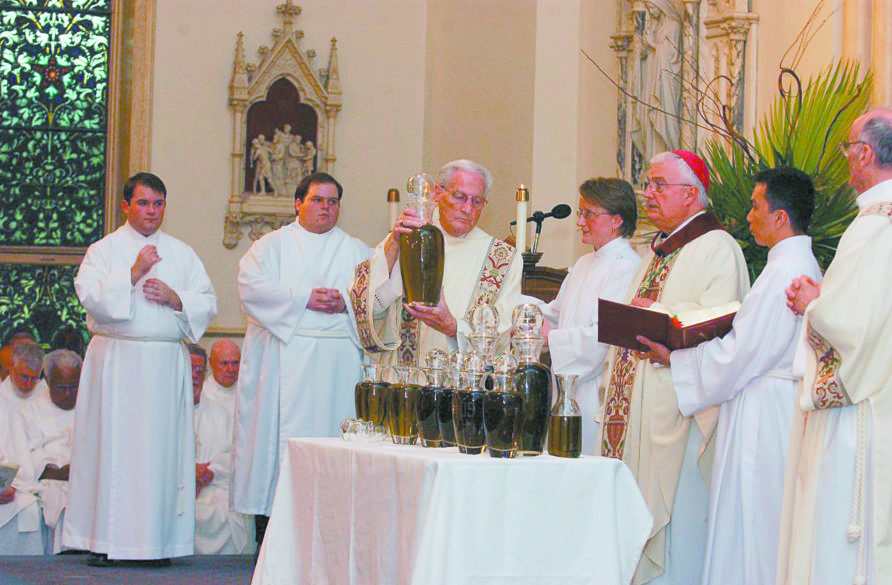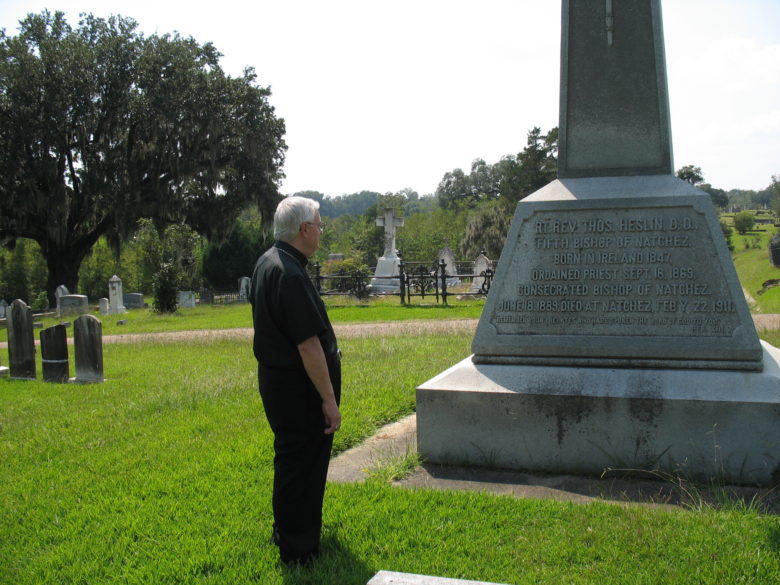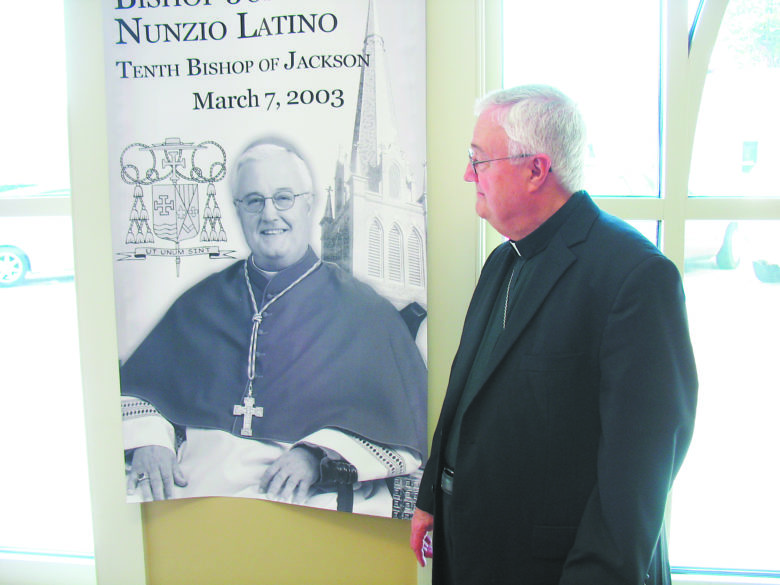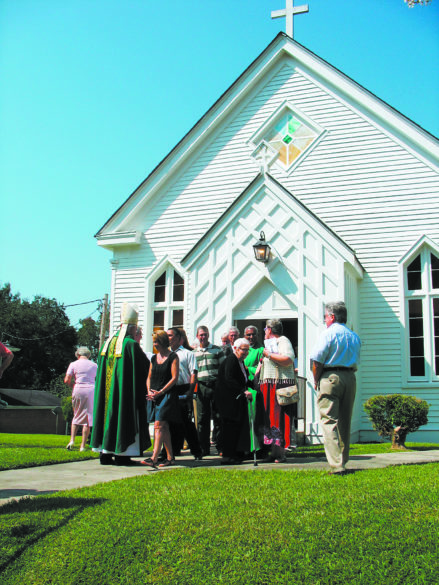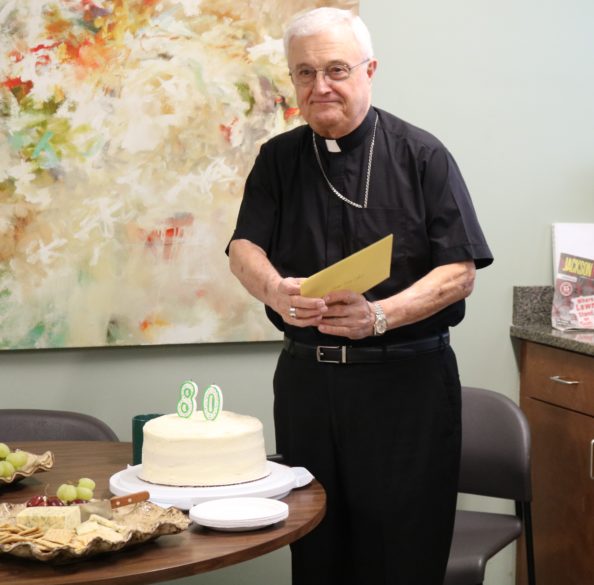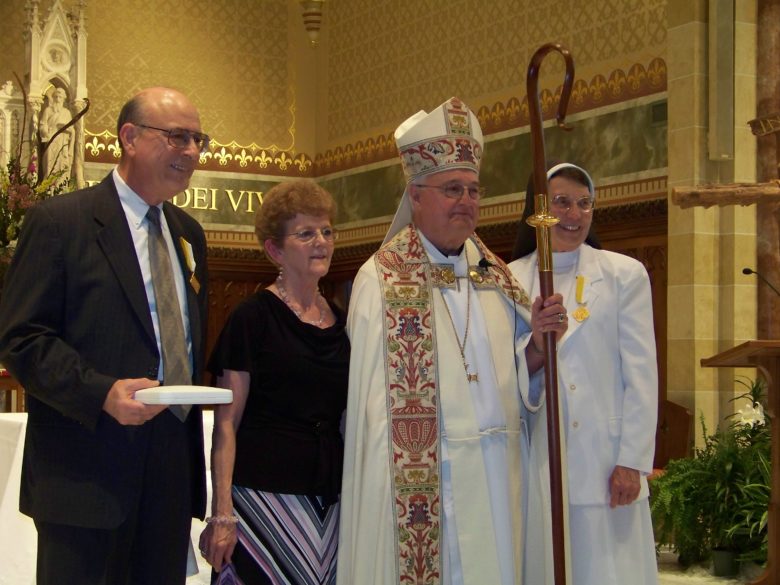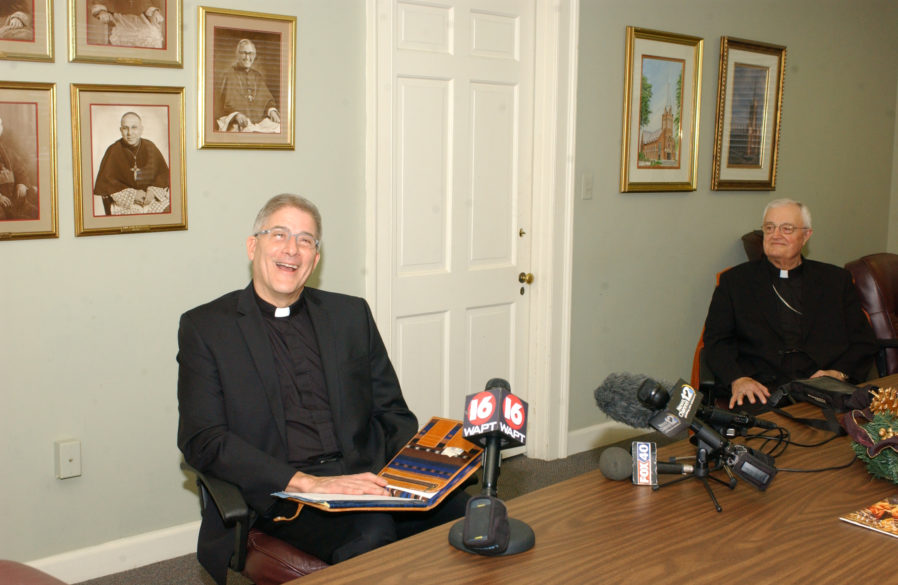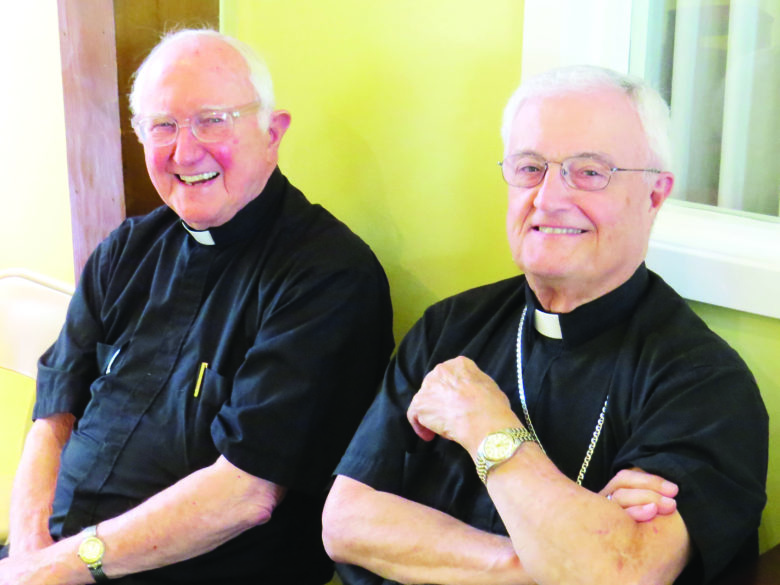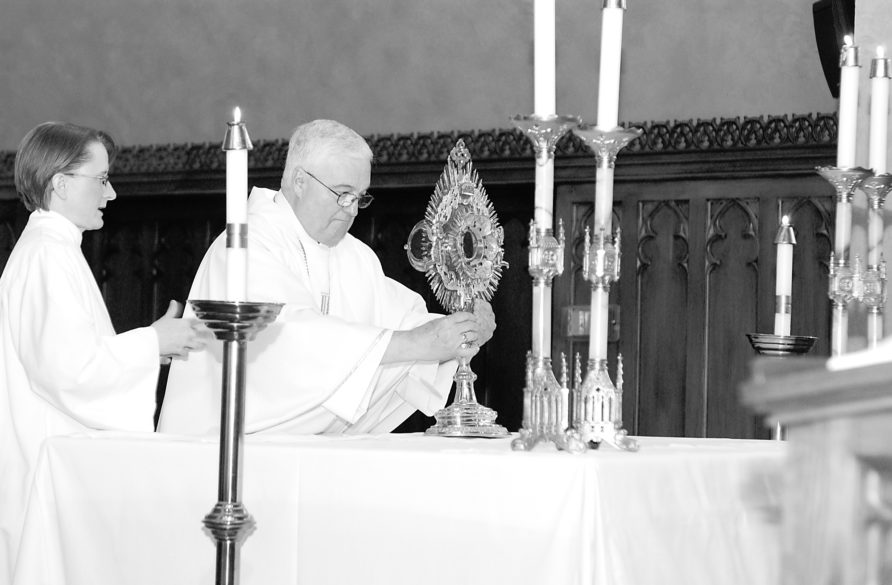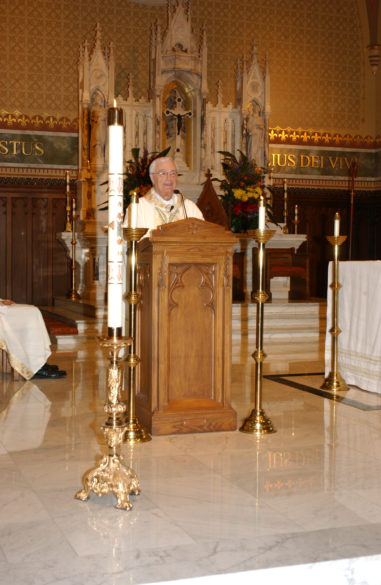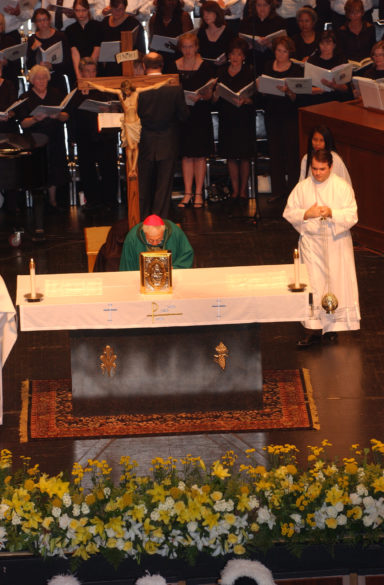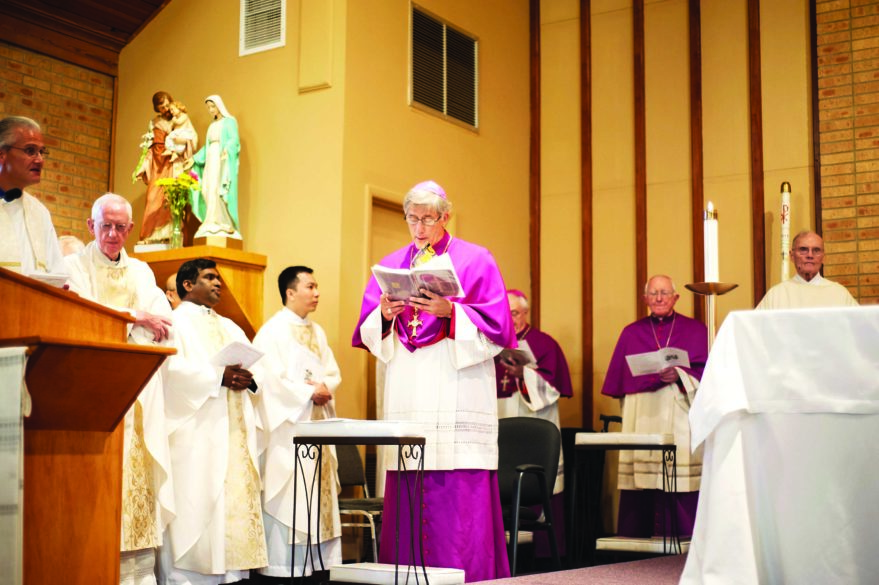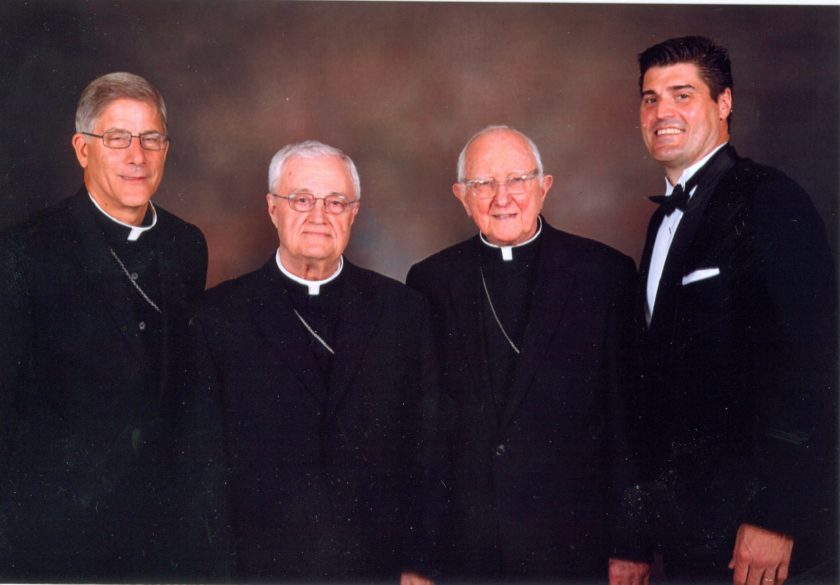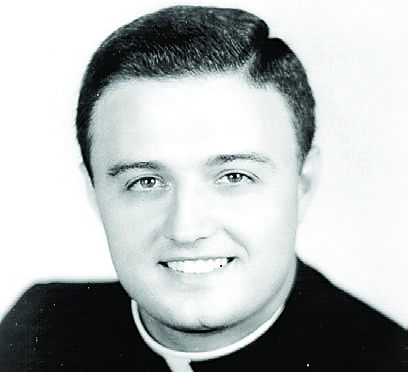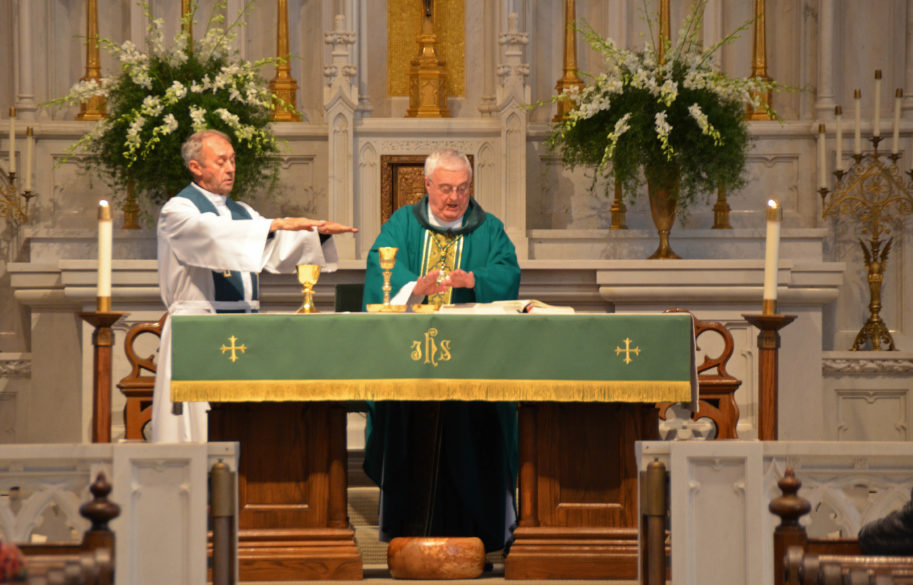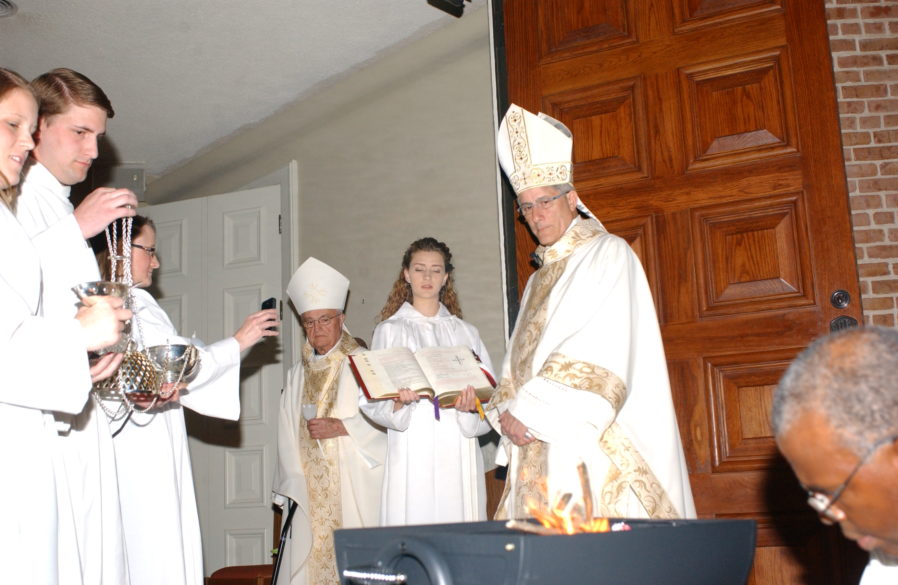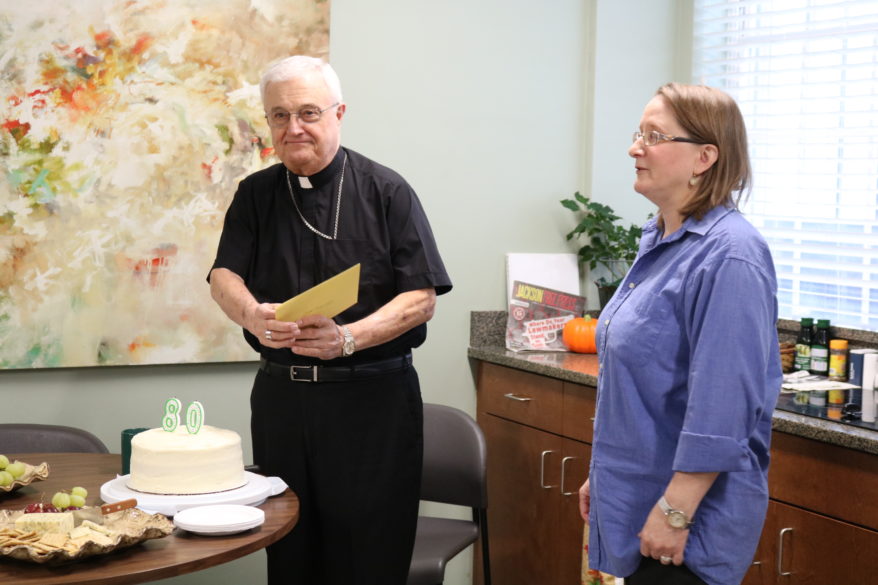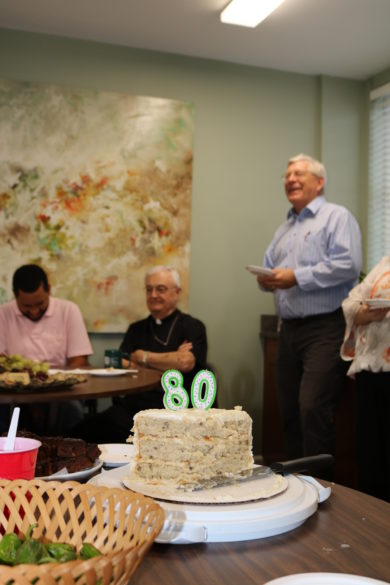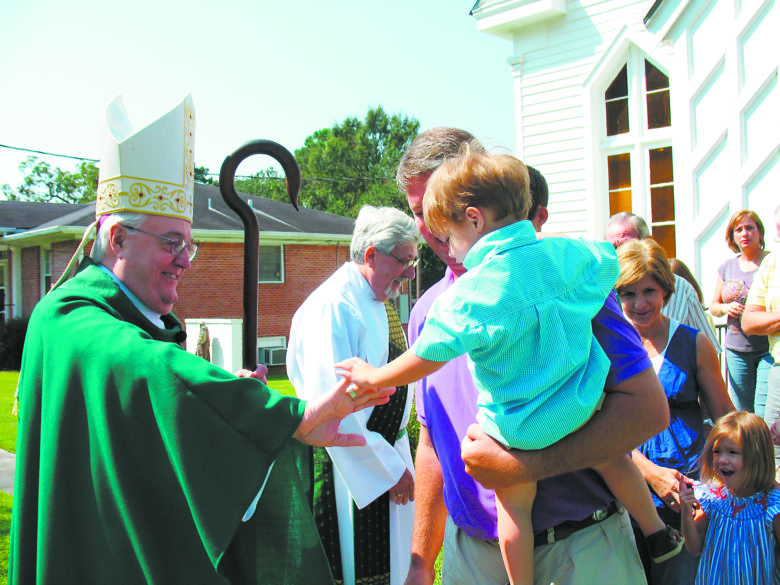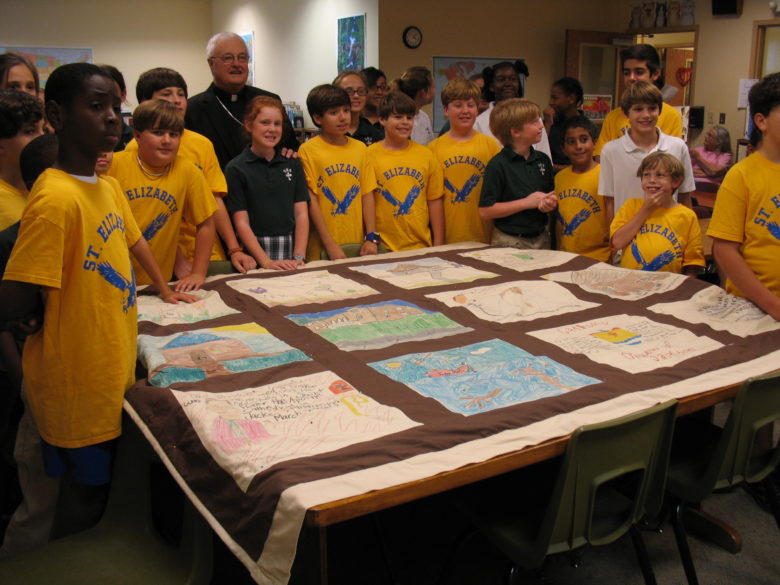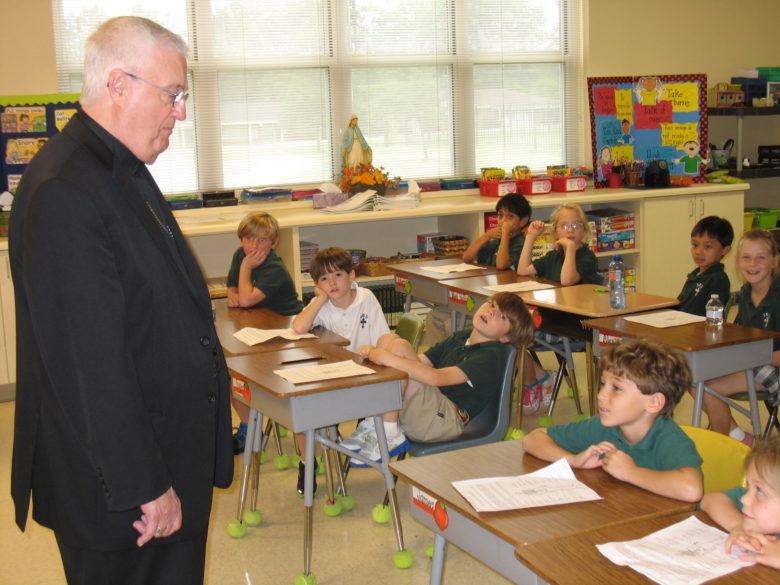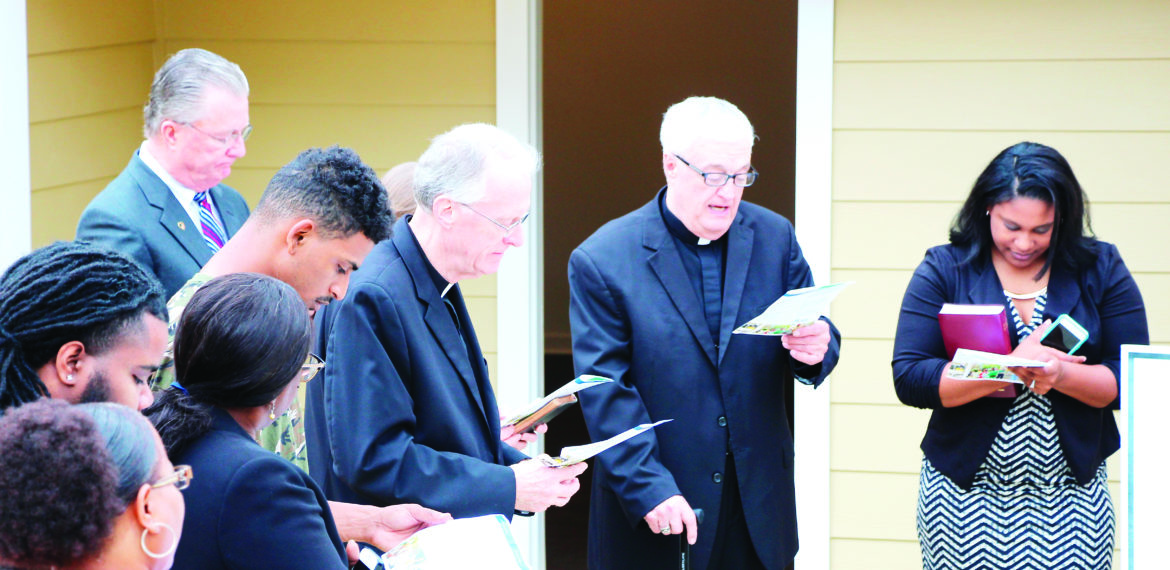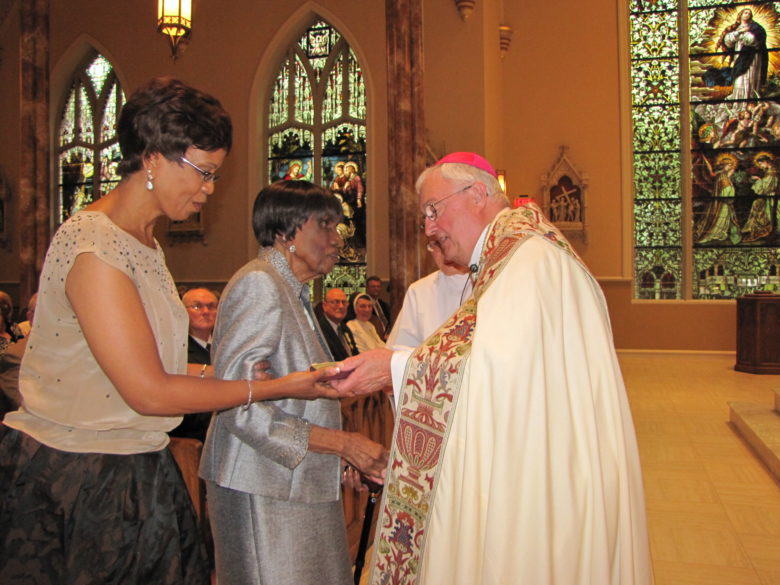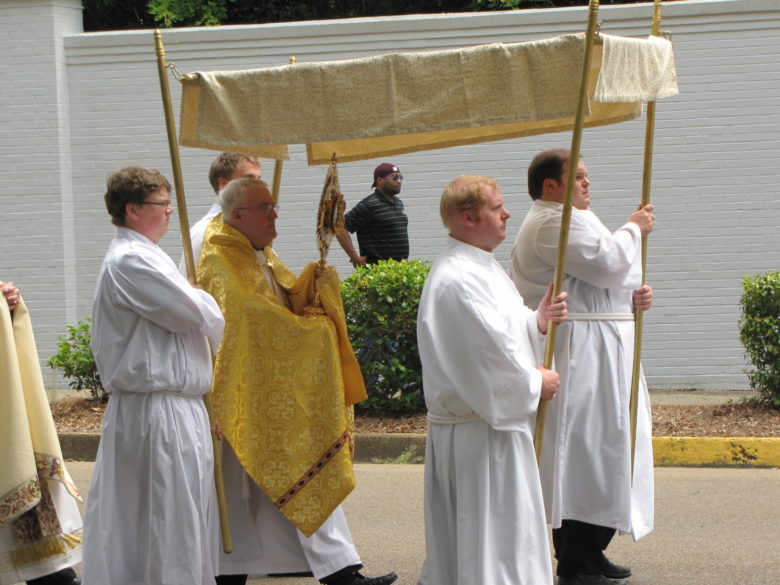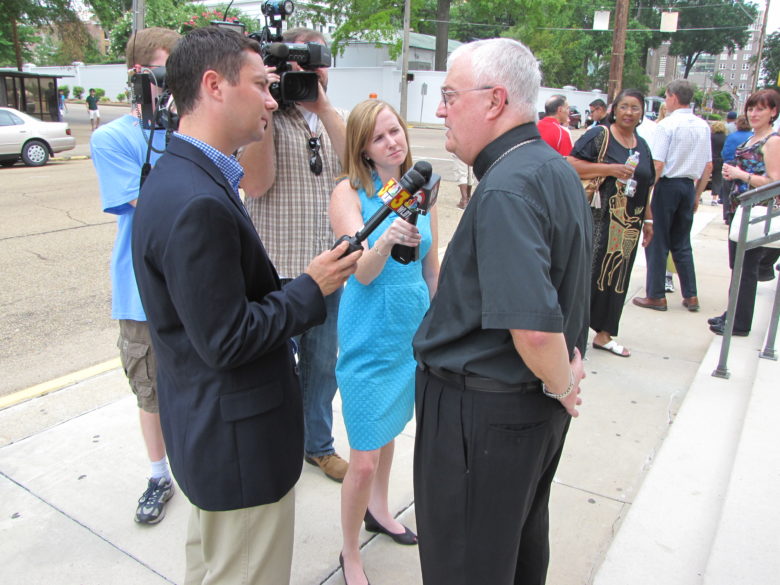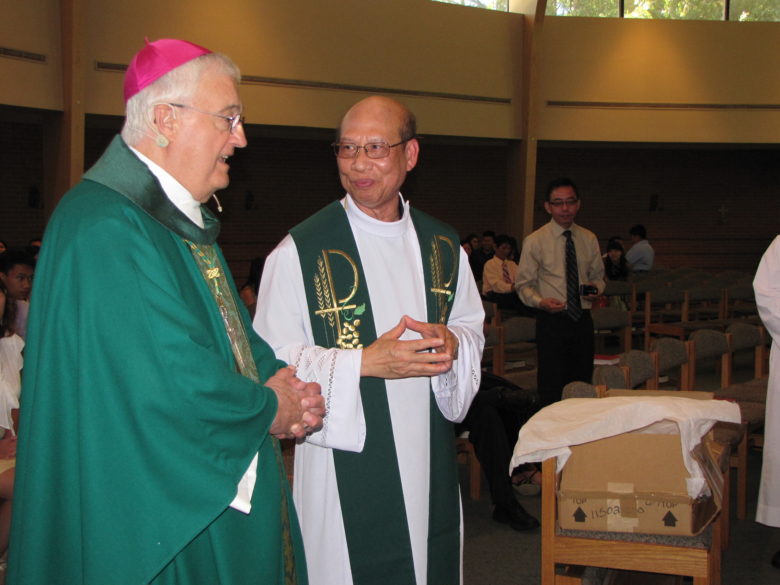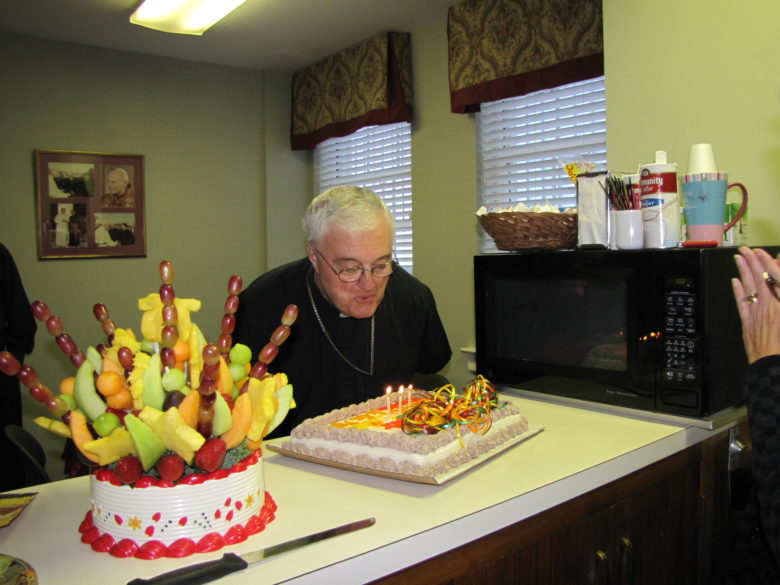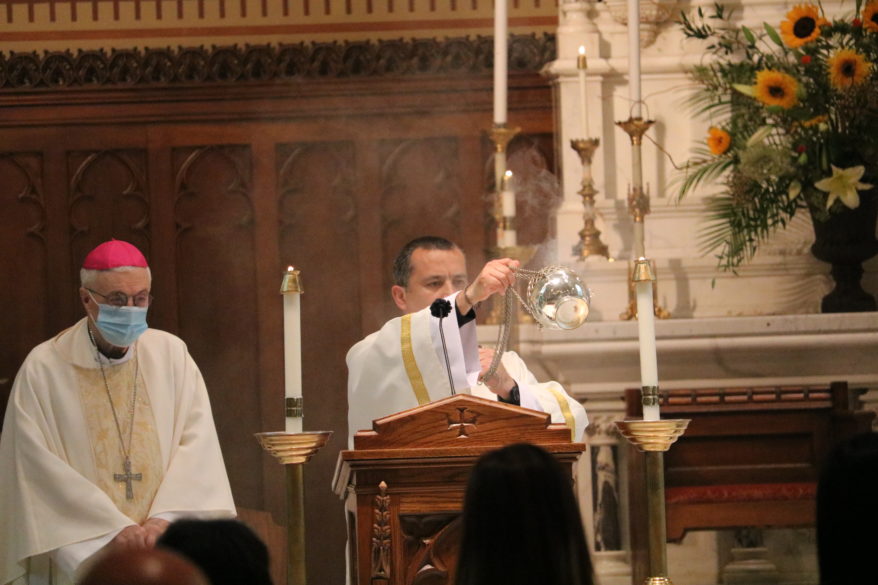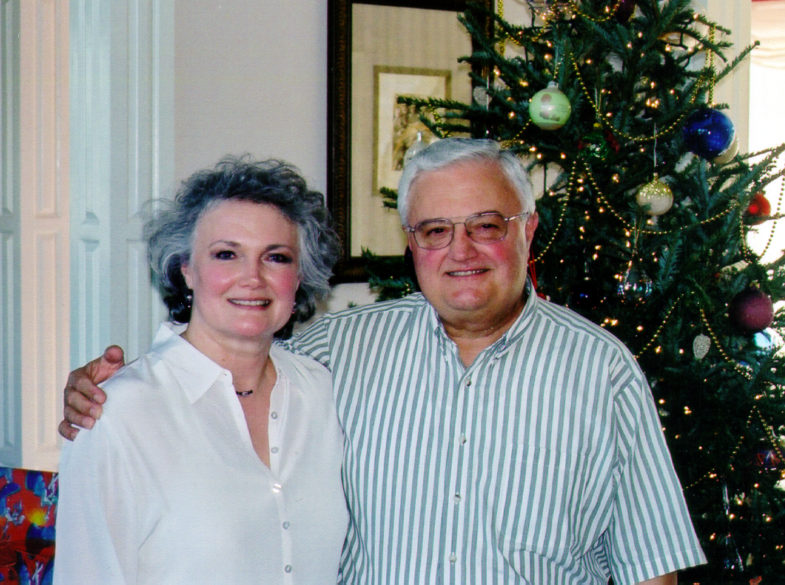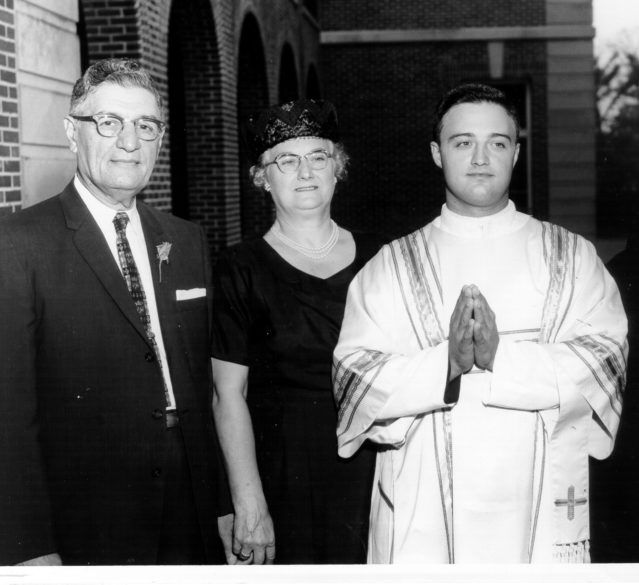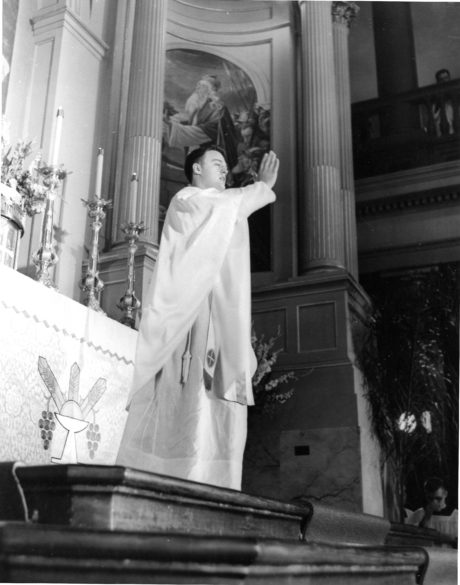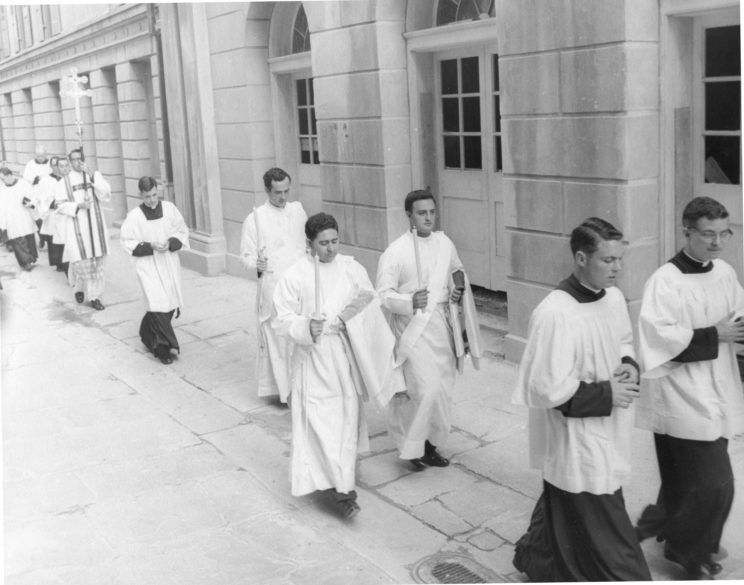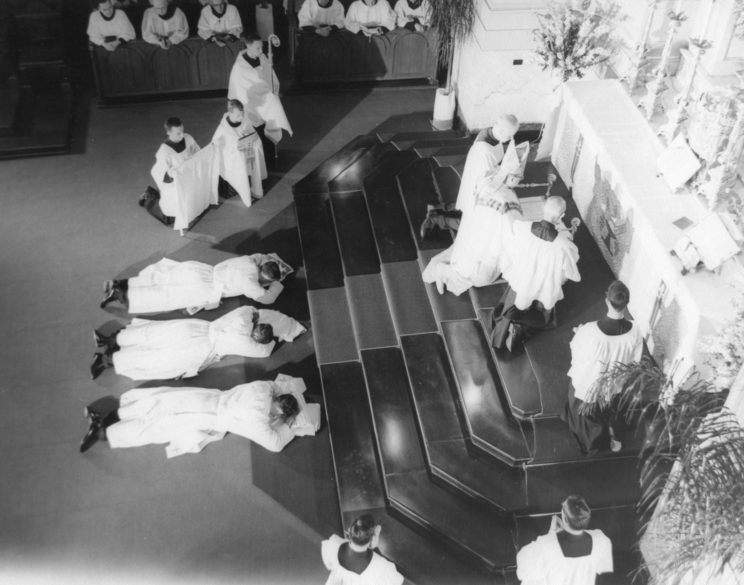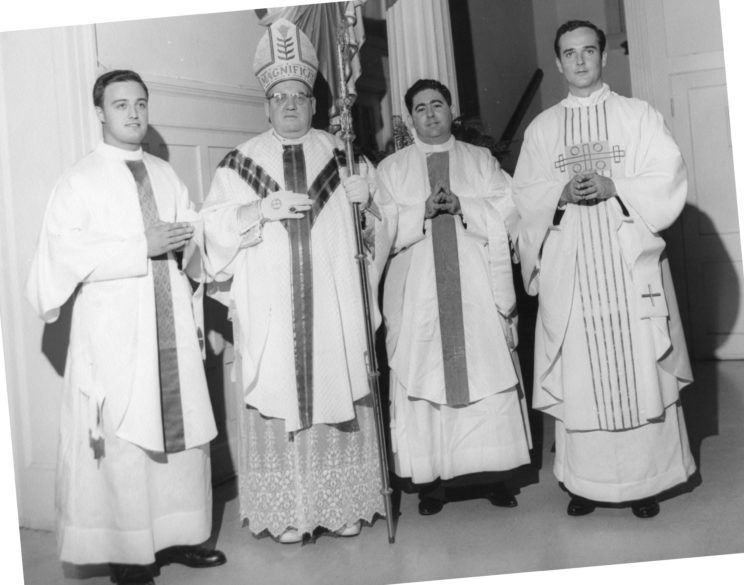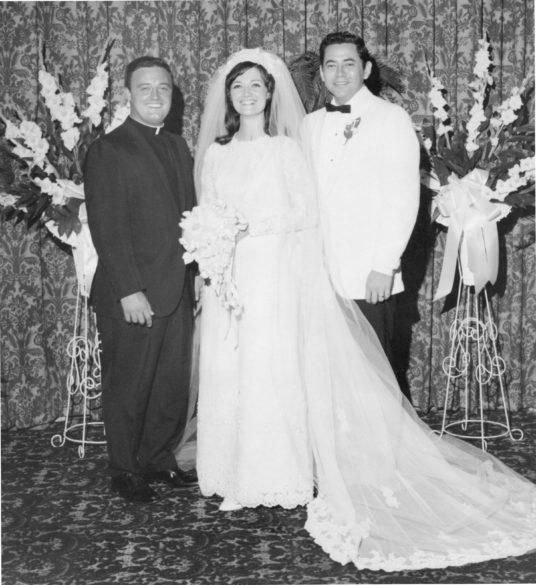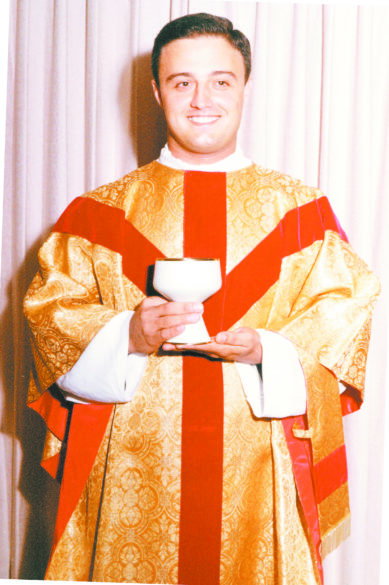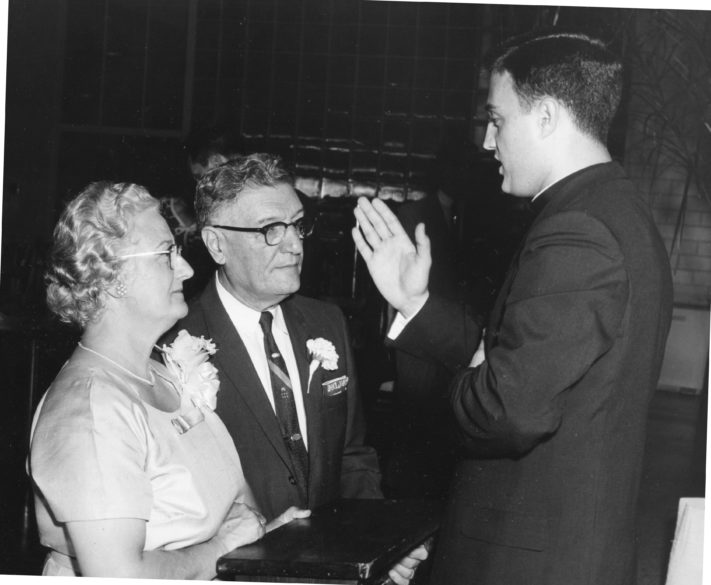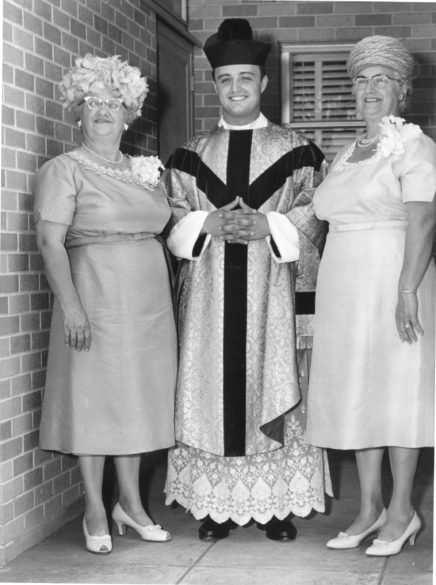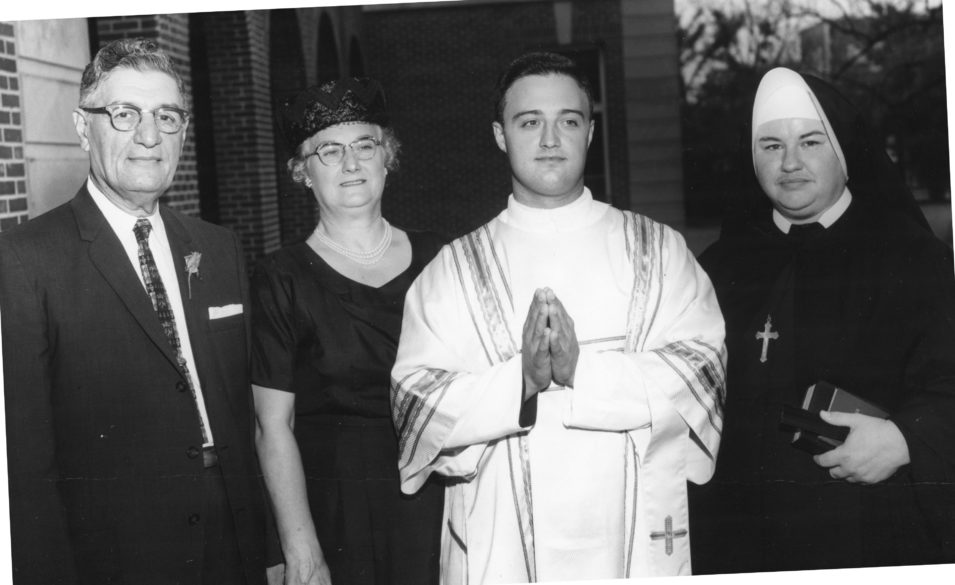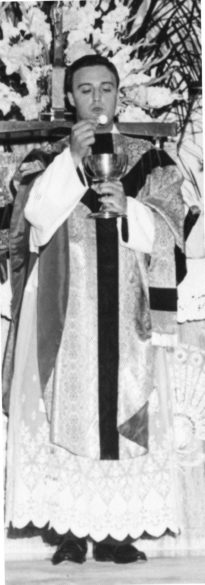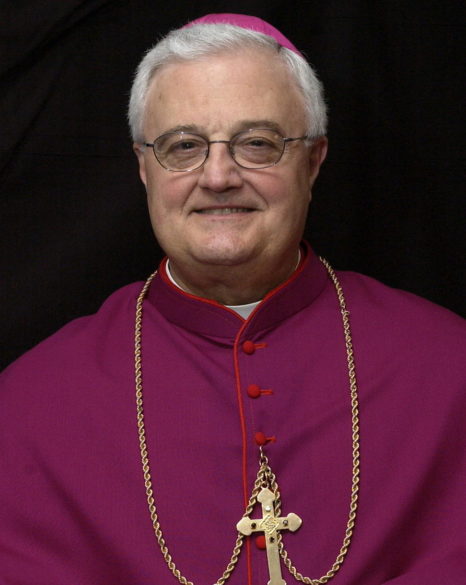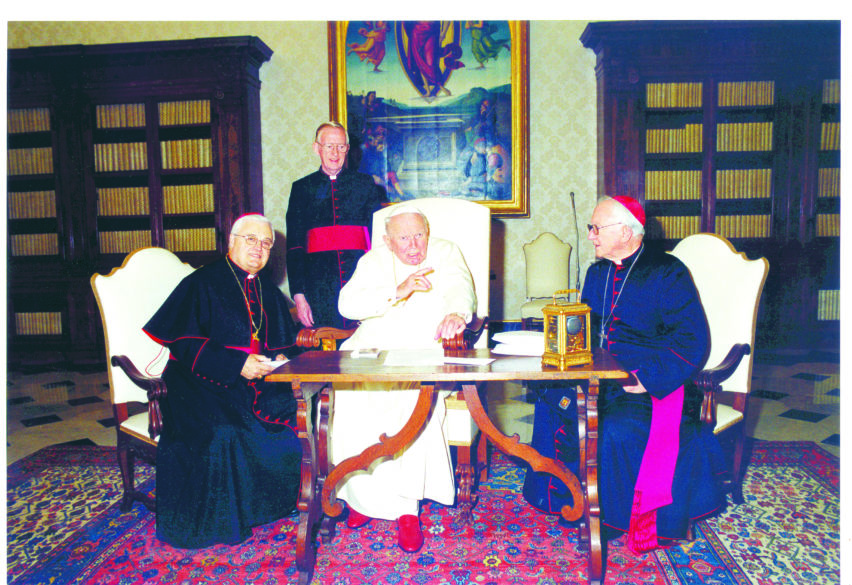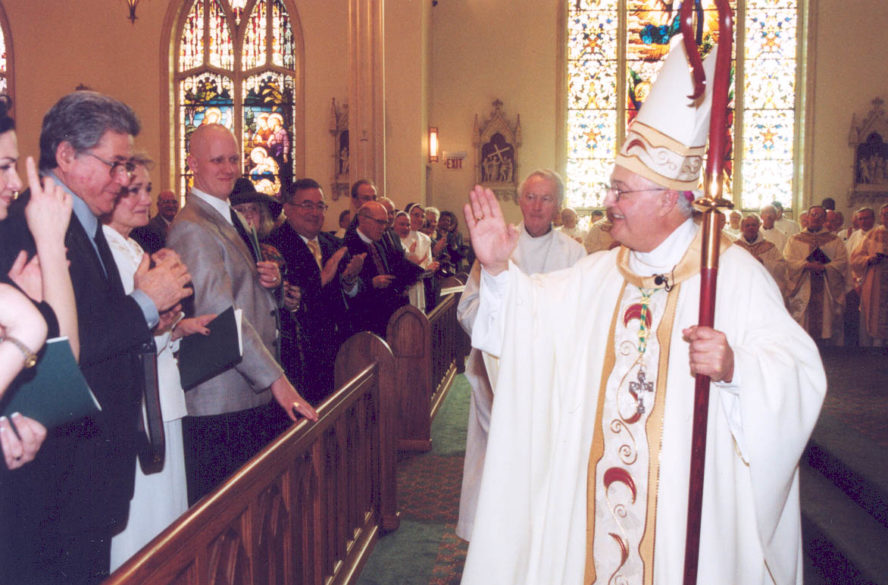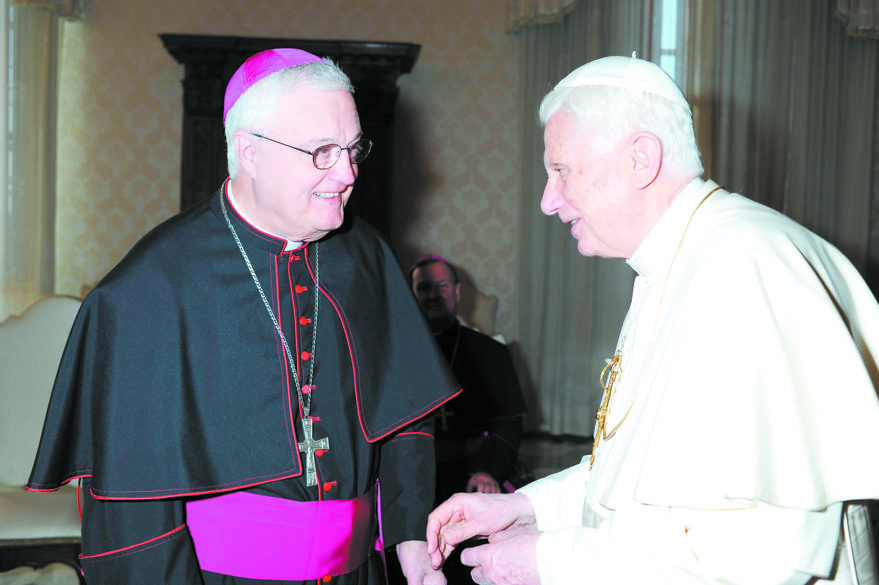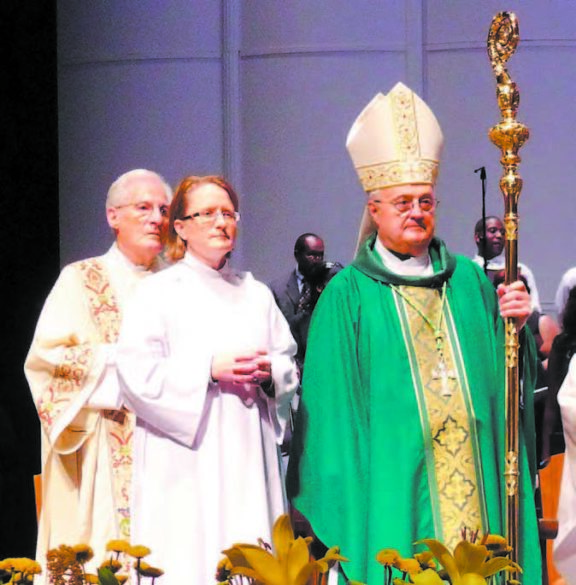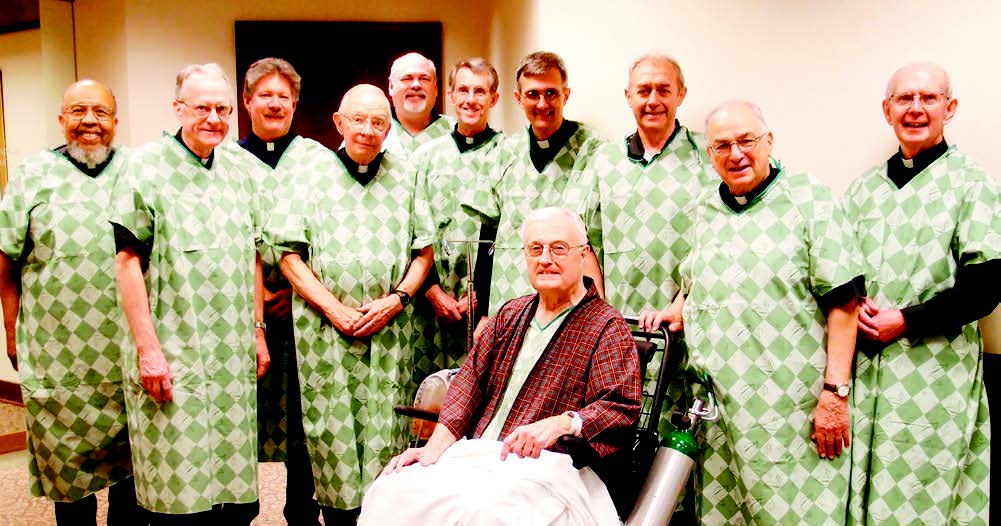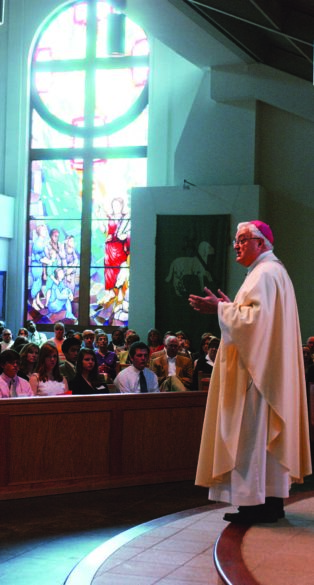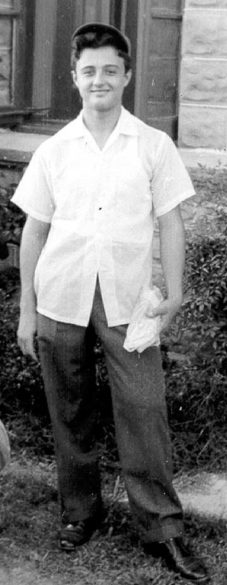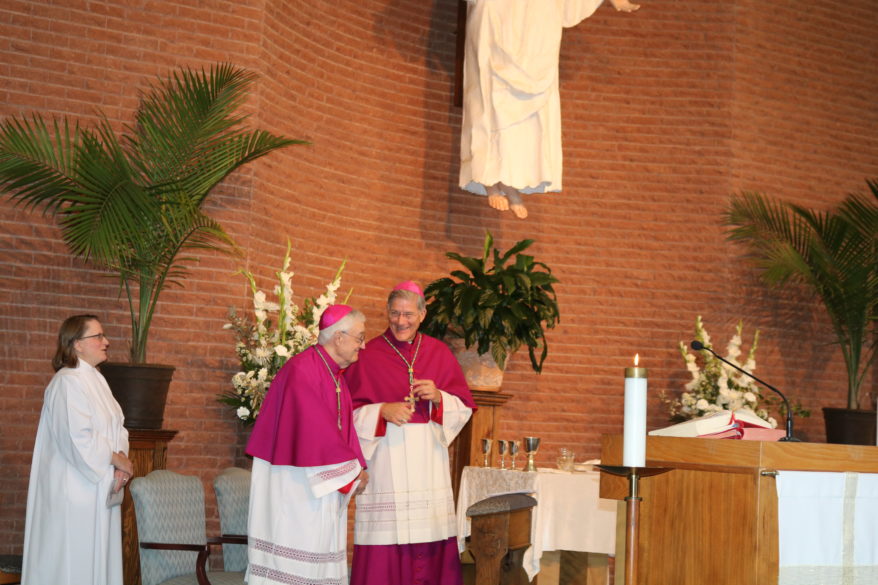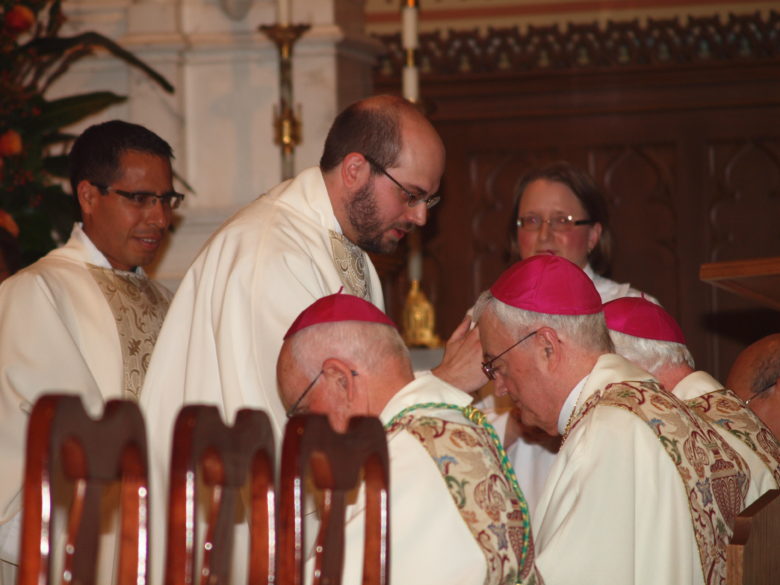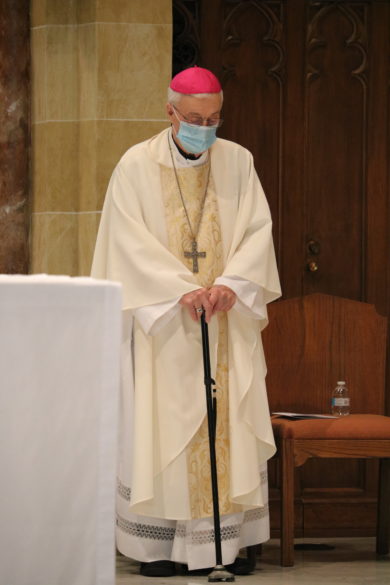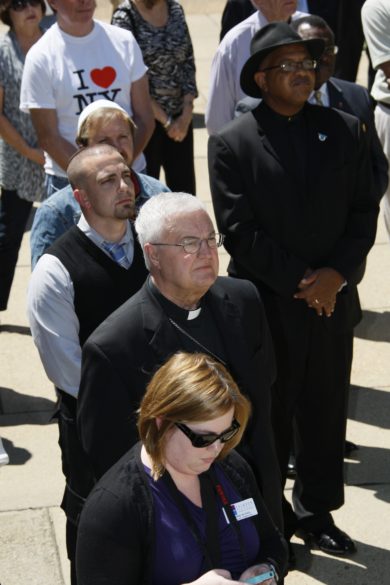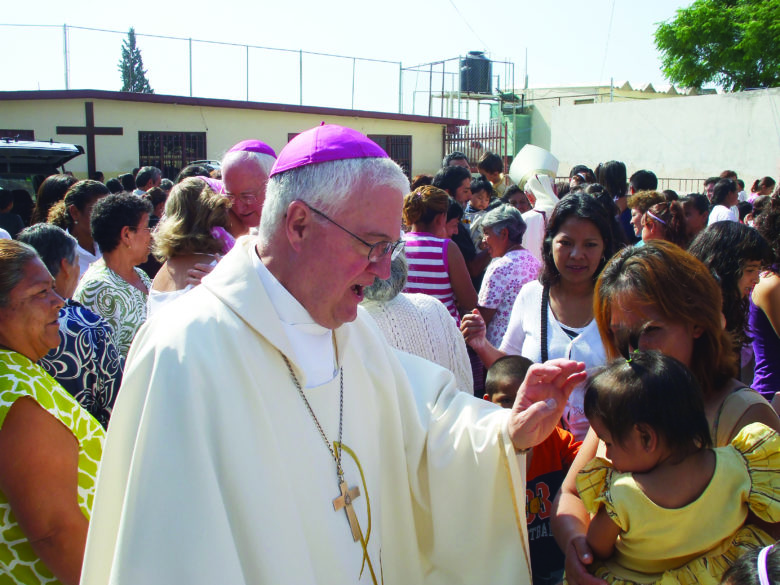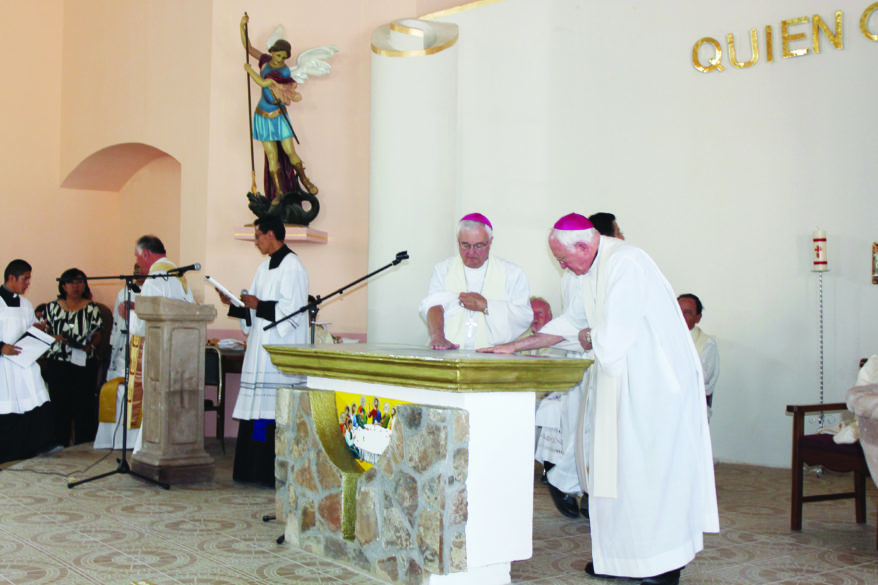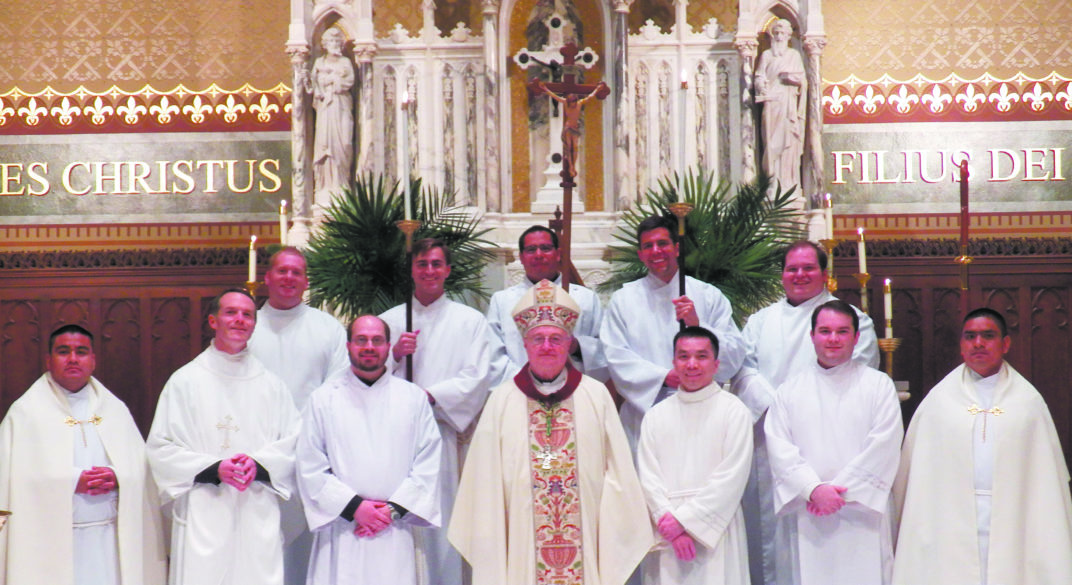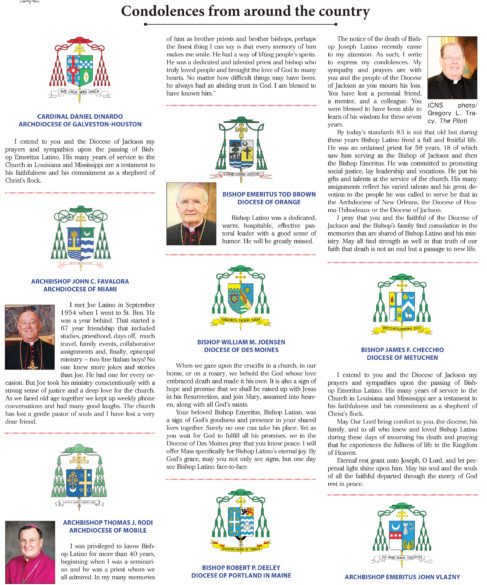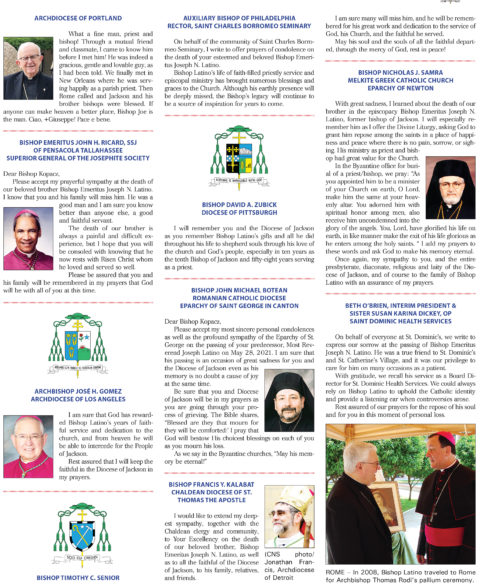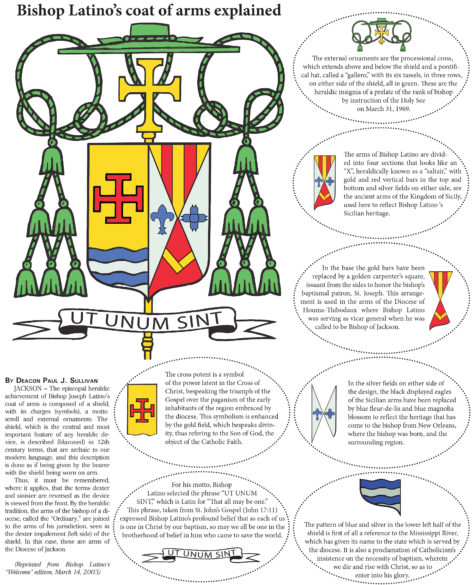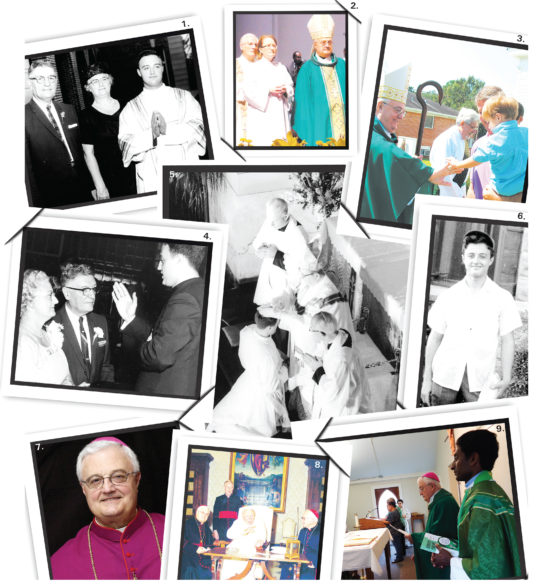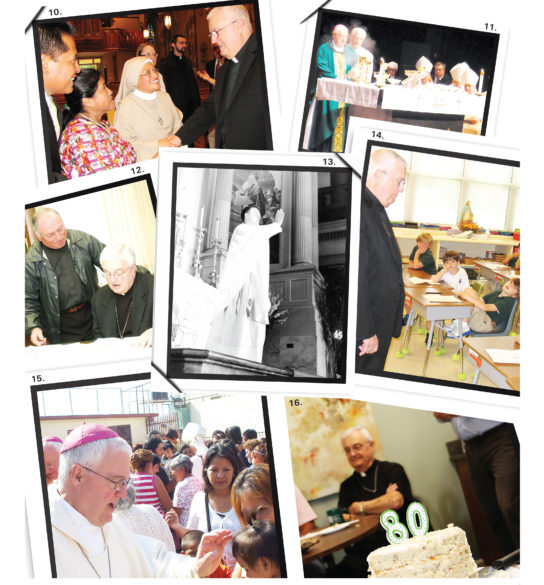Bishop Emeritus Joseph N. Latino: The man, the priest and the bishop
By Mary Woodward
It is impossible to capture the character and wisdom of Bishop Joseph Nunzio Latino in these few pages dedicated to him. One would need a few tomes to really explain his deep and abiding love for the Lord and the church, his dedication to his priesthood and his commitment to serving God’s people.
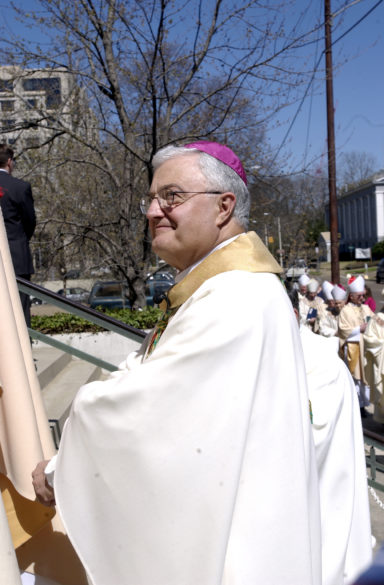
+Joseph would not want attention drawn to him and his accomplishments. Rather, as he asked for in his funeral instructions, he would want it to be about priesthood – about priestly ministry, about the life of a priest – because that was his life. +Joseph was about serving God’s people as a priest in Christ Jesus. He loved his flock and the flock loved him, which was evident by the outpouring of kind words at his death.
He loved his priesthood and wanted to live his life as a simple parish priest. +Joseph embodied the ministry of presence. Being present for God’s flock in good times and bad times was the central element of that ministry.
Priests are present for baptisms, First Communions, as witnesses of marriages and offering prayers at hospital bedsides. They become a part of the fabric of family life for parishioners. Families in Houma would include him in birthdays and graduations – even family vacations.
Other moments of presence in a priest’s life contain profound occasions of despair and sorrow in which, priestly service is challenged at its core.
One vivid moment of presence he shared was on his first assignment after ordination as associate pastor at St. Francis de Sales in Houma, which was still part of the Archdiocese of New Orleans in 1963. The pastor, Msgr. Gerald Frey, who went on to become Bishop of Savannah and then Lafayette, asked him to go be present with a family in the parish because the military was sending two officers to inform them of the death of their son in Vietnam. +Joseph never could forget the harrowing scream that poured forth from the boy’s mother. But he was there, quietly offering solace to the inconsolable.
The ministry of presence is a double-edged sword. +Joseph accepted this and lived his life in the reality of that. He dedicated himself to God’s people no matter who they were and led them to Christ by mirroring Christ to them each day.
As said above, he only wanted to be a parish priest, but God had other plans and called him through the Holy Spirit to episcopal service. In those 10 years of active service, he continued to be present to the flock even in the face of health issues which eventually took their toll.
In his eight years of retirement, he offered a different form of presence for the diocese. He celebrated Mass daily in his small chapel for the needs of the diocese, for vocations to the priesthood and religious life, and for a long list of people who had asked him to pray for them. He became spiritually present when he was not able to be physically present. His last Mass in his chapel was on the occasion of his ordination anniversary on May 25. Once again, he united his prayers with the prayers of the church in thanksgiving and in anticipation of the life that was to come for him as he neared that moment still carrying the pains of this life as his cross.
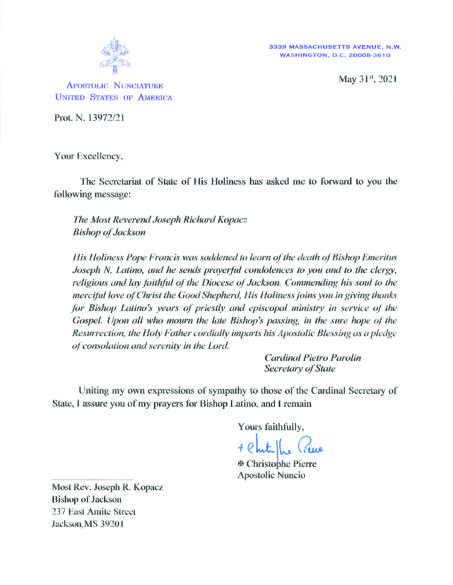
What many may not realize is that bishops come in with bundles of energy and ideas, and after several years of travel, personnel issues, administrative responsibilities, and heavy-laden decisions, they start to wear out. It is a very rewarding ministry but an extremely difficult ministry. +Joseph was weary, but he took all in quiet stride until the Lord called him home.
In these pages we are sharing reflections from his brother bishops and from the homilies shared at his wake and funeral; other pages will be devoted to aspects of his episcopal ministry – preaching the Gospel, lifting up the oppressed, and striving for justice.
+Joseph was a humble servant with a great passion for justice and indefatigable compassion for the poor and marginalized. He chose as his episcopal motto ‘That All May Be One’ from Jesus’ prayer for his disciples in John chapter 17, and he spent his 18 years as bishop trying to bring people together in Christ.
When Pope Benedict XVI declared a Year of the Priest from June 2009 to June 2010, +Joseph wrote a pastoral letter entitled: “Faithful and Wise Stewards: A Letter to Priests of the Diocese of Jackson.” It was released on Sept. 8, 2009. We are sharing snippets of that pastoral throughout this edition and will make the entire text available on the diocesan website.
We hope these few pages give our readers a better insight into the life of the man, the priest, and the bishop.
Welcome to your true and eternal home, Bishop Latino
(Editor’s note: Below is the homily that Msgr. Elvin Sunds delivered at the vigil Mass for Bishop Joseph N. Latino on June 8, 2021 at the Cathedral of Saint Peter the Apostle in Jackson.)
By Monsignor Elvin Sunds
JACKSON – When I was a seminarian, we would gather in the seminary chapel every day for morning prayer and again for evening prayer. The chapel was a large Romanesque structure with columns, arches, and a high vaulted ceiling. Much like this Cathedral. One day when we came for prayer, we discovered that a bird had somehow found its way into the chapel. It would fly from column to column, briefly landing, chirping, and taking off again. It added entertainment and a bit of joy to our prayer. This went on for several days. Then one day, the bird was gone. It had somehow found its way to freedom. As mysteriously as it had appeared, it disappeared. But we all know a bird is not created to fly inside a building. It is meant to soar outside in the unlimited freedom of the open sky. Nevertheless, we enjoyed its brief visit.
Life is like that. We are created by a loving God and are born one day. We spend a limited number of days on this earth enjoying life and loving each other. But we are created for so much more … so much more. We are created to live forever with an infinitely loving God. Our days on earth are brief. They are spent preparing for eternity by loving God and by loving and serving our fellow human beings. Then, one day we are called from this earth to return home to our loving God forever.
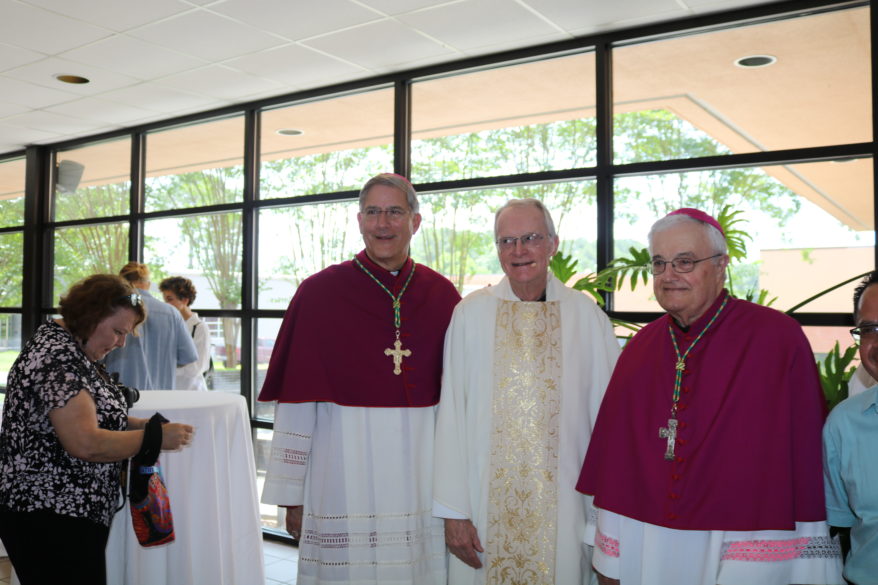
Bishop Joseph Latino was born in 1937 and ordained a priest in 1963. Most of his priestly ministry was spent in Houma-Thibodeau, Louisiana. He was appointed Bishop of the Diocese of Jackson in 2003. I had the privilege of working with Bishop Latino for nine years as his Vicar General. I am also privileged to enjoy his friendship for many more years. He was a humble, gentle, and kindly bishop.
He chose as his episcopal motto, “That all may be one.” The motto comes from the Gospel passage that was just proclaimed. In that Gospel Jesus is praying for his disciples, and he also prays, “For those who will believe in me through their word, that they may all be one, as you, Father, are in me and I in you, that they also may be in us.”
Jesus’ prayer is that through the proclaiming of the Gospel, may we all share together in the life of God as one. That was the motto and the focus of Bishop Latino’s episcopal ministry. He wanted all of us to be one in Christ Jesus. He promoted that unity in Christ.
During his years as bishop, he proclaimed and spread the Gospel in many ways. He promoted lay ministry and helped establish programs to educate and prepare lay persons for ministry in the church. He appointed many Lay Ecclesial Ministers to oversee parishes and missions that did not have a full-time pastor.
He promoted religious vocations. He reinstated a formation program for the Permanent Diaconate. During his tenure several men were ordained to the priesthood for the diocese. He also welcomed international priests to proclaim the Gospel and help serve parishes in the diocese that otherwise might not have a priest.
During his tenure, the office for the Protection of Children was established to help insure a safe environment for children and vulnerable adults in churches, schools and communities.
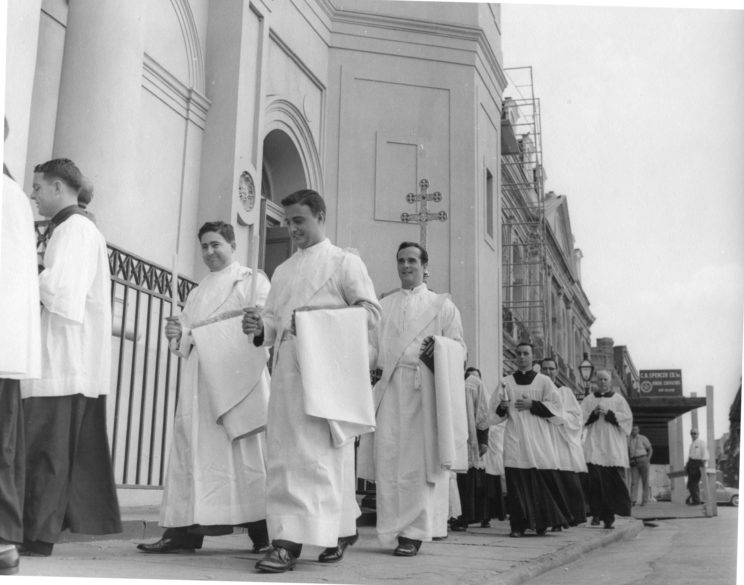
As Bishop, he promoted Gospel-based social justice. He publicly addressed such issues as racism, the rights of immigrants, care for the poor, the death penalty and the right to life of the unborn.
The Diocese of Jackson was blessed by the ministry of Bishop Latino. He was a gentle and kind shepherd who loved us. He lived up to his motto proclaiming and spreading the Gospel so that we all may be one in Christ Jesus. We are thankful for the gift of his ministry, his leadership and his friendship.
We thank the Lord for the years we enjoyed his loving service as our Shepherd. But like the bird in the seminary chapel, he was created for so much more. So, we commend him to the Good Shepherd, Jesus Christ. May Jesus Christ welcome him and say, “Well done good and faithful servant. Welcome home to the place prepared for you for all eternity. Welcome to your true and eternal home.”
Amen.
The Shepherd and the Sheep: Bishop Latino at Parchman Penitentiary
By Father Tim Murphy
He always began his visits in the upper tiers of the cell block, with his suit jacket laid on a grimy railing and his Roman collar tucked into his shirt pocket for relief from the stifling heat. Each man received the same greeting, “Good morning, I’m Joe Latino. I’ve been praying for you. I was hoping we could talk for a few minutes.”
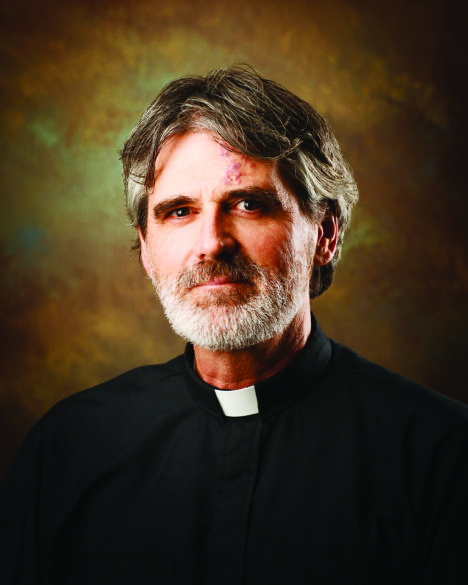
Few men said no. Most of the inmates already recognized him from the widely distributed diocesan newspaper, Mississippi Catholic. This led to one of Bishop Latino’s favorite stories. He approached a new arrival and gave his usual greeting. The man sat silently on his bunk, looking directly at the Bishop. He did not respond but walked to the cell bars and said, “Yeah, I know who you are, I got your mug shot right here,” as he showed the Bishop his “official” newspaper column photo.
The inmate said, “You gotta get a new picture. You look a whole lot better in person!” The Bishop could work a crowd. He said, “Ya’ think so? I got some people who think I look worse!”
He loved to have someone ask, “Bishop where you from? You talk kinda’ funny.”
His standard reply was, “Where you think I am from?” Invariably, they guessed “Somewhere up North. Maybe Brooklyn.” Other guys would add, “Yeah, you sound like those guys in the movies from New York City.”
Their guesses allowed him to respond with “full-bore” New Orleans-accent (as he tried to speak while laughing) “MAN WHAT YOU TALKIN ‘BOUT? Brooklyn?! New York City!? I’m from New Orleans!!“
He distributed prayer cards of Saint Joseph, introducing him as the adopted father of Jesus, explaining that the Saints are available as intercessors. He said, “I think men need to understand Saint Joseph.” His sincerity carried the conversation. He was at home among the men, holding their hands as they prayed. If a man asked to pray for him, Bishop Latino simply bowed his head.
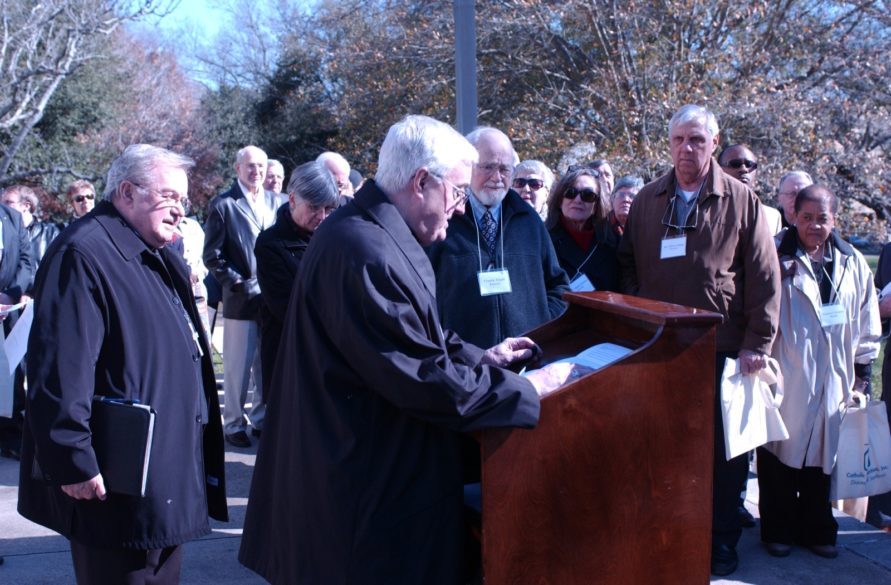
In the last years of his visits to Parchman, Bishop Latino was slowed by poor health and in obvious pain. Still he insisted on making the same rounds, climbing the steps and visiting all the men. He was well-known among the correction officers and staff. They offered to drive him to the units or arrange for a motorized cart. He always declined, saying, “You are so kind, but I would like to walk there just like you do every day.”
One time, 50 inmates from Dismas, the Catholic prison ministry, had been waiting over two hours to attend Mass when Bishop Latino discovered that his Vestments were sequestered in another unit about two miles away. He saw the makeshift Altar, the Sacramentary, chalice and paten, bread and wine and the Lectionary, and said, “We’re all set. It’s OK. I can celebrate Mass in a T-shirt if I have to. These men have been waitin’ long enough.” As can only happen in true stories, a deputy warden delivered the vestments one minute later, and he stayed for the Mass.
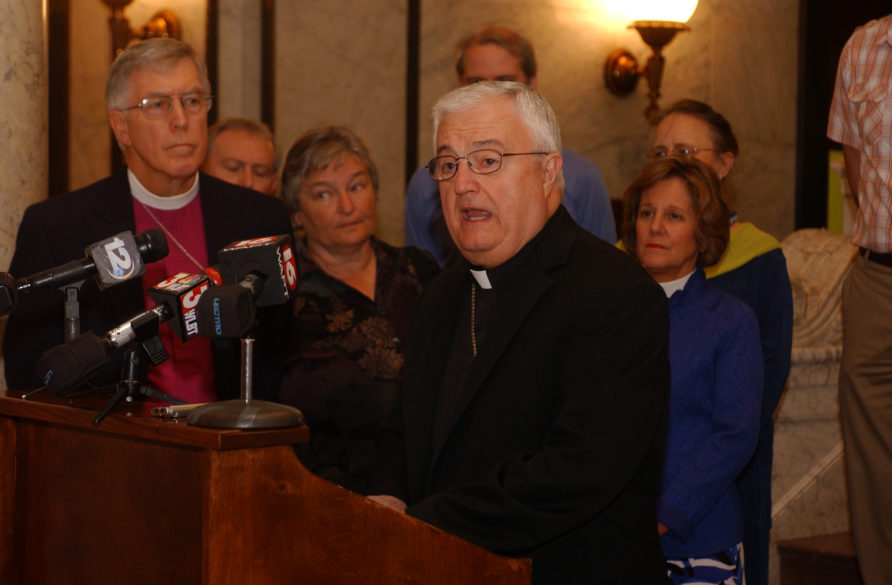
In all his visits to Parchman, Bishop Latino encouraged the inmates. He assured them that their lives could be redeemed in Christ, even after years of isolation and rejection in the poor conditions of the prison. Walking among them, telling stories, he said, “The Lord understands. He is with you. Trust in that.”
When the Mass ended, the deputy warden asked me, “Is that guy really a Bishop? He connects with these guys.”
I assured him that he was. Years before Pope Francis’ famous remark, Joe Latino understood that the Good Shepherd must be close with his flock, close enough even to take on the smell of his sheep.
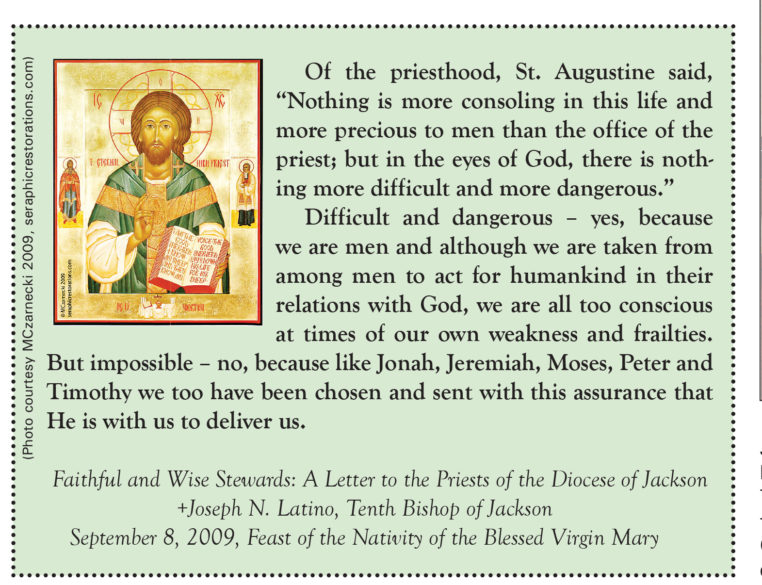
Latino’s advocacy for life
By Mary Woodward
JACKSON – During his tenure, much of which coincided with the tenure of Gov. Haley Barbour, Bishop Joseph Latino was outspoken on issues reflecting the church’s teaching on the consistent ethic of life. Gov. Barbour knew each time an execution was scheduled at Parchman he would be getting a letter and a phone call from Bishop Latino.
Bishop Latino also worked with other faith leaders on initiatives around immigration reform, children’s health and safety, payday lending practices, and better access to health care. In 2013, he was awarded the Mississippi Religious Leadership Conference’s Founders’ Award for his commitment to eradicating the death penalty and his advocacy for better healthcare for the working poor.
Bishop Latino followed the axiom that the Gospel “afflicted the comfortable and comforted the afflicted.” This wisdom fueled his efforts to speak out for justice.
Below are sections from various statements he issued to public officials advocating for better conditions for the poor and marginalized.
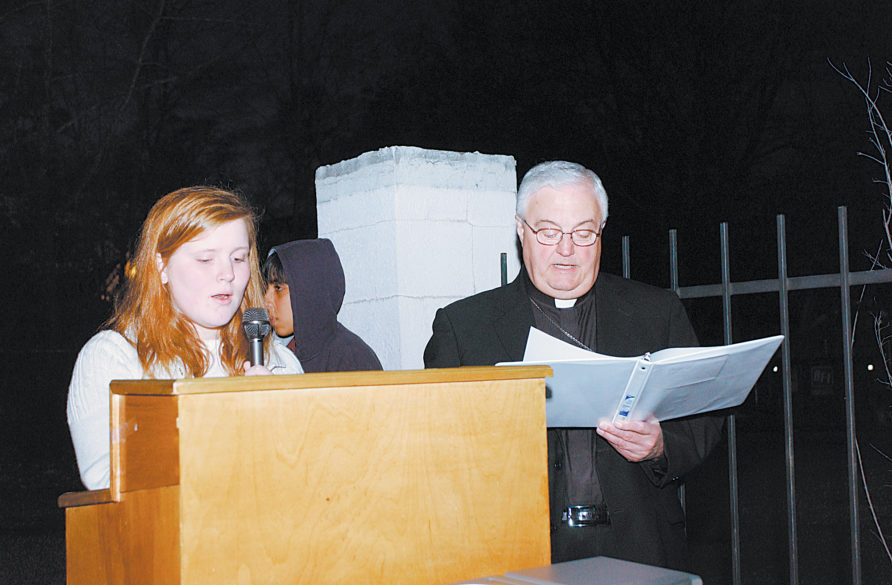
Letter to Gov. Haley Barbour – May 2008
With all due respect, I must say that I am disappointed and dismayed at the passage of the Mississippi Employment Protection Act (SB 2988) by our State Legislators and by your signing of it into law. This law is an affront to basic human dignity and even more the dignity of the human family.
It is unfortunate that little thought or concern was given to the fact that now more and more children born in this country will be taken away from the arms of their mothers and fathers and become the wards of the State. It is a sad statement on our character as a state when politics steps on the most vulnerable members of our society – our children.
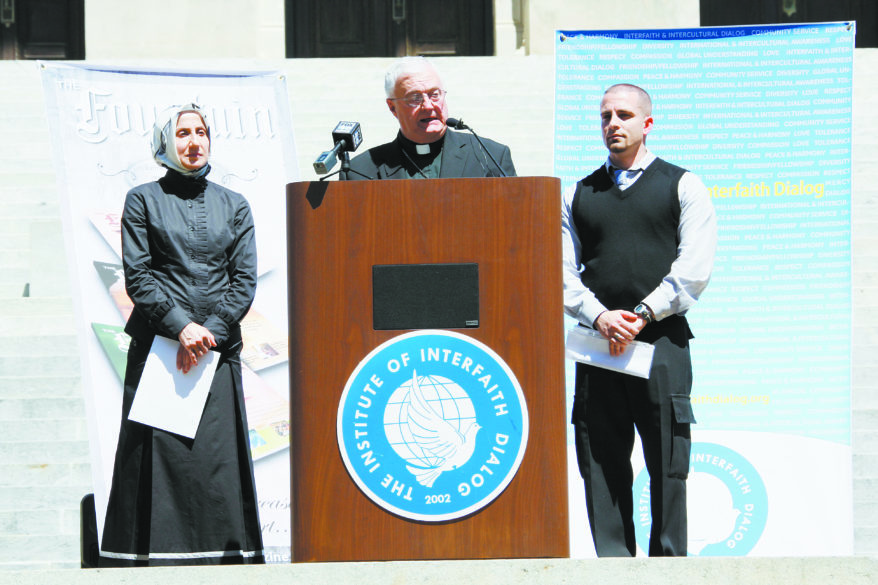
Payday Lending Reform – January 7, 2011
Payday Lending Reform is an ethical and moral issue that the State of Mississippi desperately needs to address. Payday lending businesses currently exist in practically every community in our State. These businesses operate outside the Small Loan Act and often charge exorbitant amounts of interest to those who borrow from them at times exceeding 500% annually.
As most of their clients are poor, these businesses entrap individuals in a vicious cycle of borrowing and indebtedness. We recognize the need for poor people to have an opportunity to borrow small amounts of money to make ends meet, but we should not allow lending businesses to prey on those living in poverty.
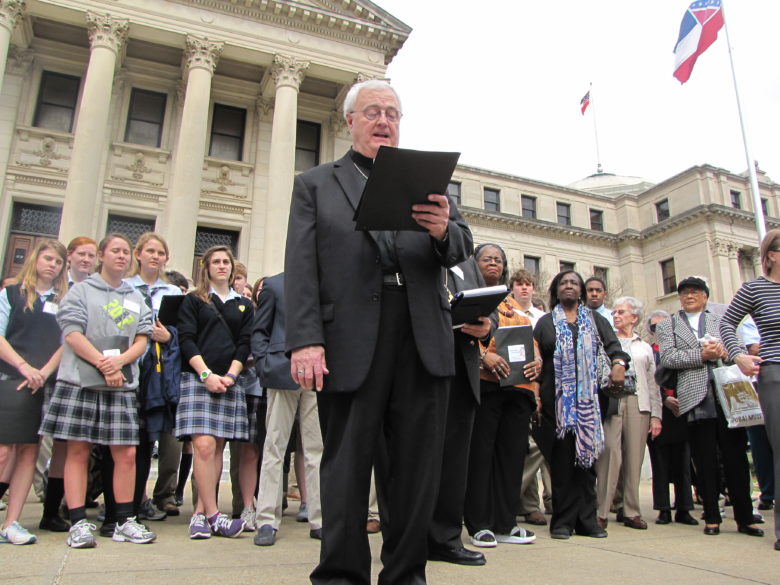
Catholic Day at the Capitol – Feb. 29, 2012
As Catholics we have a responsibility to the Gospel message to love God and love our neighbor. We certainly fulfill this responsibility by ensuring that proposed legislation respects these fundamental ideals and principles rooted in Sacred Scripture and the teachings of our Catholic church: namely – the life and dignity of the human person, the call to family and community, the rights and responsibilities that come with freedom, the option for the poor and vulnerable in our midst, solidarity with the suffering, and caring for God’s creation.
Surely public issues such as the expansion of Medicaid, the welfare of children and immigration, as well as the myriad of other challenges facing our state have strong moral dimensions. Indeed, the well-being of our citizenry should be at the forefront of all legislation. As Catholics we must always defend the dignity of the human person and the dignity of the family.
The moral voice of religious leaders and people of faith is paramount to forming the conscience of our nation. Indeed, our country through its tradition of diverse religious faiths is enhanced and enriched when these faiths contribute their values to civic life and public debate.
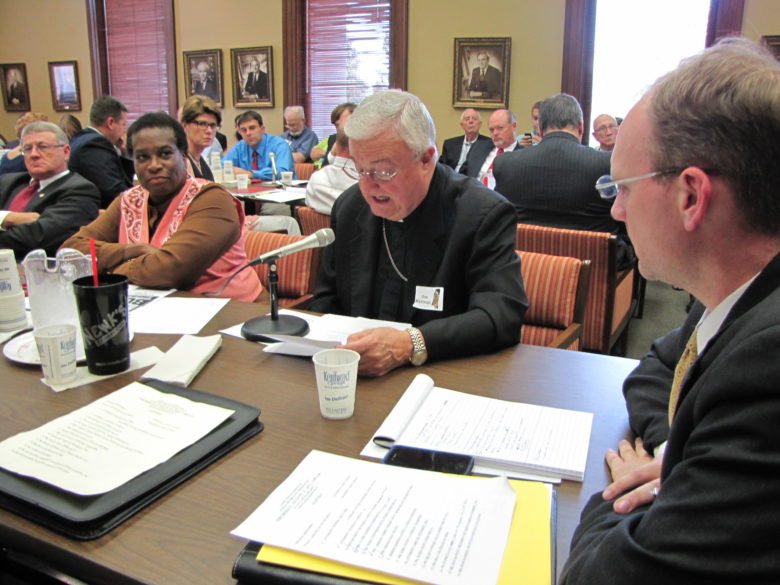
Legislative hearing on immigration – Aug. 23, 2012
As a faith leader and a Christian, I express my deep concern about the growing climate of an anti-immigrant attitude developing in our communities and in the halls of State government. I am very distressed by efforts directed at passing legislation that threaten the dignity of the human person and the basic human rights that we attach to the dignity of the family unit.
We do not need to enact legislation that threatens this sacred dignity by forcing human beings to live in fear and in hiding, by separating children from parents, and by keeping parents from seeking health care for their children because of fear.
Moreover, on a practical level, such legislation will place a greater obligation for enforcement on already stressed personnel and a greater strain on already limited resources available for law enforcement.
As a faith leader I call upon you to refrain from drafting and enacting legislation that will adversely affect our local communities and businesses.
“Medicaid Expansion” – December 10, 2012 before the Mississippi State Senate Public Health and Insurance Committees
Within the Catechism of the Catholic Church (2288), it is written that: “Life and physical health are precious gifts entrusted to us by God. We must take reasonable care of them, taking into account the needs of others and the common good. Concern for the health of its citizens requires that society help in the attainment of living conditions that allows them to grow.” Among these conditions include food, clothing, housing and health care.
From this faith tradition, we come here today to urge the state legislature to support Medicaid Expansion. The following reasons underscore how expansion will serve to create a healthier and prosperous society:
First: Medicaid Expansion will connect 310,000 Mississippians to health insurance
Second: The majority of people benefitting from Medicaid Expansion are the working poor.
Bishop Latino cared about the above issues and so much more, speaking out against injustice and advocating for those silenced by life experiences, systemic oppression, generational poverty and a myriad of things that stifle God’s vision “that all may be one.”
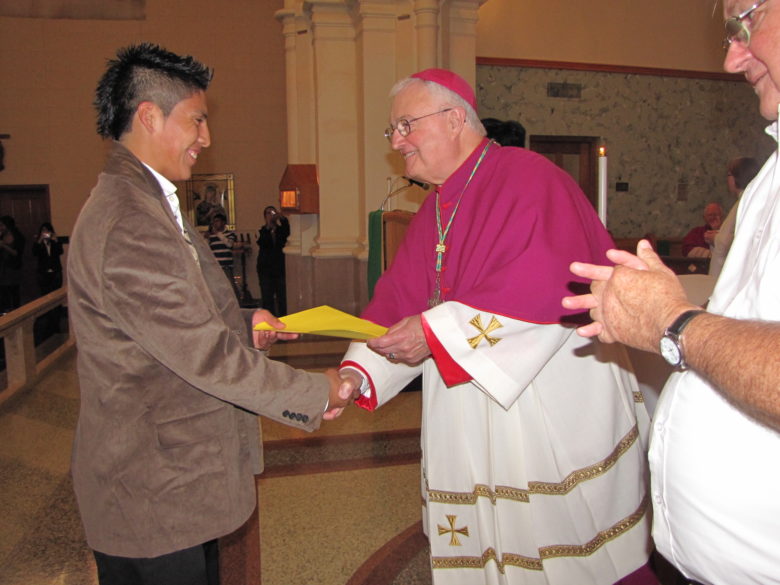
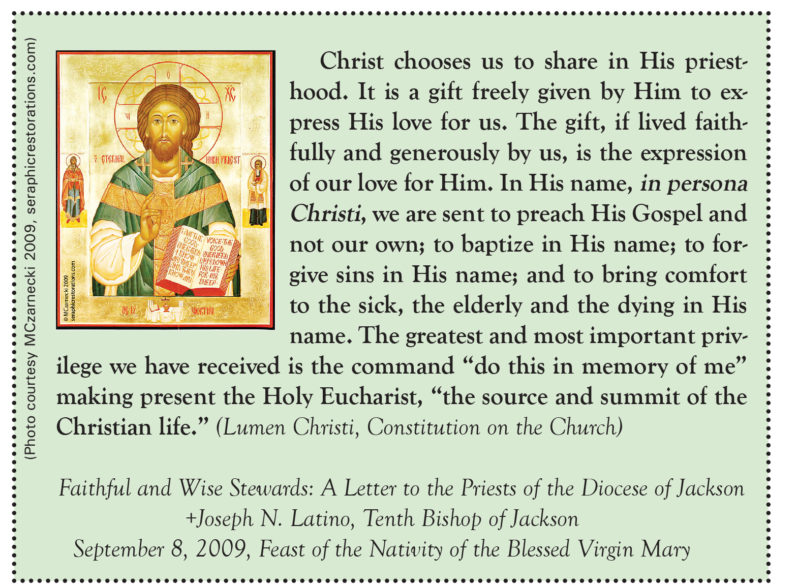
Our steadfast servant answered the call
(Editor’s note: Below is the homily that Bishop Kopacz delivered at the Mass of Christian Burial for Bishop Joseph N. Latino on June 9, 2021.)
By Bishop Joseph R. Kopacz, D.D.
My first encounter with Bishop Latino was at the airport in Jackson when I arrived the night before I was announced as the 11th Bishop of Jackson on Dec. 12, 2013. He was there to welcome me. He had a very broad smile knowing that his successor was real and had arrived. His gracious and welcoming spirit remained constant over these past seven and a half years in many ways. There were some light moments even before arriving. Some mistook his middle name, Nunzio, for nuncio, and they thought I was following the Apostolic Delegate. Others observed that my facility with the Spanish language will serve me well because I was replacing a Latino. Oh well.
Ut Unum Sint – That all may be one
The unity that Bishop Latino’s episcopal motto proclaimed is at the center of the great priestly prayer of Jesus at the Last Supper in John’s Gospel. This prayer has its source and summit in the unity that Jesus Christ has with the Father and the Holy Spirit, a mystery woven throughout the Gospel of John that so inspired Bishop Latino as seen in his Gospel selection for today’s Mass. The Gospel of John begins sublimely: “In the beginning was the Word and the Word was with God and the Word was God.”
In the middle of the Gospel at the Last Supper the washing of the feet commences with the bold assertion that “Jesus knowing that the Father had given all things into his hands, and that he had come from God and was going to God, rose from his supper, laid aside his garments, and tied a towel around himself.”
Toward the end of the Gospel on the night of the resurrection Jesus breathed into his apostles the gift of the Holy Spirit, after embracing them in peace and saying to them, “as the Father has sent me so I send you.” His apostles, anointed in the Holy Spirit and consecrated in the truth for mission, were sent to preach the Gospel as a living body, in all of their diversity. They were one!
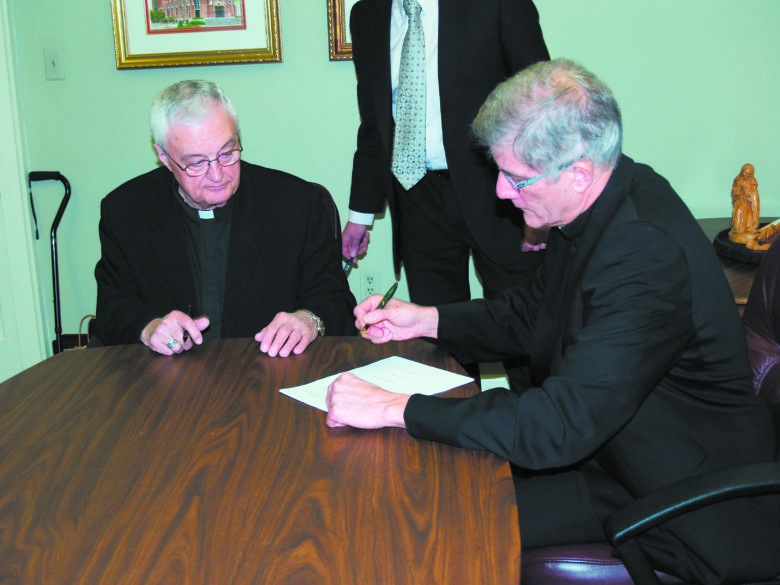
In his Episcopal motto and in his choice of the Gospel for today’s funeral liturgy, we find the core of Bishop Latino’s vocation to the priesthood culminating in his consecration as the 10th Bishop of Jackson.
Today’s Gospel passage is under the heading “The authority of the Son of God.” “Truly, truly, I say to you, he who hears my word and believes him who sent me, has eternal life … For as the Father has life in himself, so he has granted the Son also to have life in himself.”
There is no doubt that Bishop Latino lived his priestly vocation with a deep sense of the Lord’s call and authority over his life. Throughout his 58 years and two days in the priesthood of Jesus Christ he served with the heart of the Good Shepherd, to build up his body, the church, for the salvation of all, with that graciousness we heard at the end of the passage from Thessalonians: “Encourage one another, and build one another up.”
Like the prophet Jeremiah he felt the Lord’s call to the priesthood from his youth. Like Jeremiah, there were daunting challenges as one can expect when coming forward to serve the Lord as the Book of Sirach soberly states, but once Bishop Latino put his hand to the plow he did not look back.
He was ordained in 1963 in the middle of the Second Vatican Council. Just when he thought he had all the answers after 12 years of seminary formation, in a matter of two or three years, the church and the world changed most of the questions. Obviously, he dug deeper and in the words of Sirach he set his heart and remained steadfast, by the grace of God.
Forty years later, after steadfastly serving in the Archdiocese of New Orleans and in the Diocese of Houma-Thibodaux as vicar general and pastor of the Cathedral for many years, he was anticipating downsizing in his priestly duties, so to speak, like maybe a smaller parish. Oh well!
The phone rang; he took the call, and answered the call, and once again he set his heart right and remained steadfast, and moved north to become the 10th Bishop of this amazing diocese.
Bishop Latino had come forward to serve the Lord early in life, and steadfastness endured as a defining virtue of his character and his priesthood, a mindset that motivated him to work in the Lord’s vineyard in a variety of pastoral ministries, to achieve that unity for which the Lord Jesus prayed and laid down his life. Over his ten years as Bishop of Jackson, the Lord brought forth new growth, fruit that lasts to this present moment. Of course, in his unassuming matter he might say, I just stayed out of God’s way.
St. Pope John Paul II on the occasion of his 50th anniversary of ordination wrote a reflection on his priesthood entitled, Gift and Mystery. In chapter seven, he asks: Who is the priest? What does it mean to be a priest?
He recalled the words of St. Paul. “This is how one should regard us, as servants of Christ, and stewards of the mysteries of God. Now it is required of stewards that they should be found trustworthy.” (1Cor. 4:1-2)
We give joyful thanks for Bishop Latino’s trustworthy service for nearly six decades, for years in the fullness of his strength and as time passed accepting the changes in his health that humbled him, in the words of Sirach, our first reading.
In his retirement, at times, he grieved the physical limitations that prevented him from serving more actively in the diocese, but at the foot of the Cross his ministry of prayer and presence was a treasure for us. His early monastic formation served him well in his later years. Through it all he trusted in the Lord who called him from his youth, and in holy fear, grew old in God.
My final encounter with Bishop Latino was sitting at his bedside within hours of his death, softly saying the rosary and praying the Night Prayer, as he slowly passed from this world to the next. I spoke the words that he no longer could.
Now, Master, you let your servant go in peace. You have fulfilled your promise.
My own eyes have seen your salvation, which you have prepared in the sight of all peoples.
A light to all the nations; the glory of your people Israel.
This is the cornerstone of Night Prayer that all priests offer at day’s end, reminding us of who is the master, and whose glory is at work.
I trust that as Bishop Latino’s body wasted away, his inner self was being renewed every day, in the words of St. Paul. What is seen is transitory, what is unseen is eternal.
Eternal rest grant unto him, O Lord, and let perpetual life shine upon him. May he rest in peace. Amen.
May his soul and the souls of all the faithful departed rest in peace. Amen.
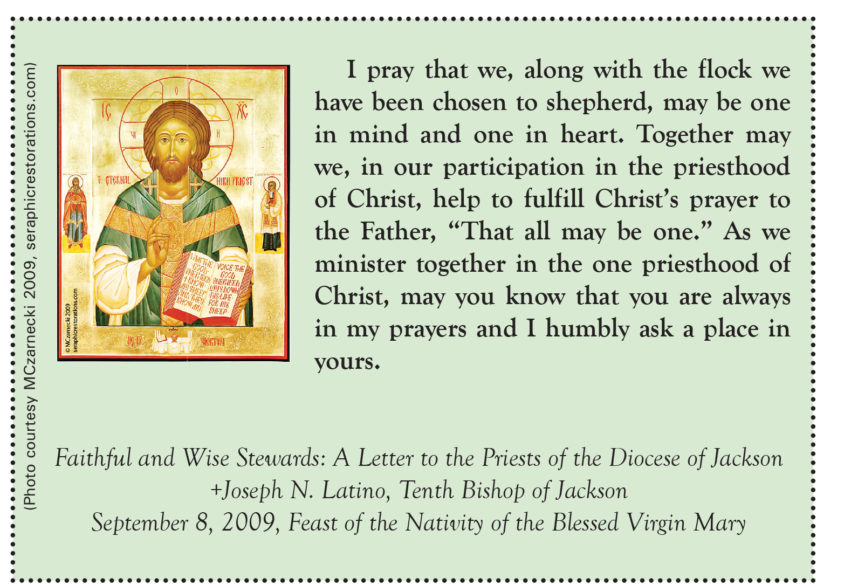
Journeys and travels near and far
By Mary Woodward
JACKSON – As a child growing up in New Orleans, Bishop Joseph Latino’s early travels involved trips across Lake Ponchartrain with his Uncle Joseph Tusa to 80 acres of land Tusa owned in Abita Springs, Louisiana. This was a big adventure for a second-generation Sicilian living in the city. Being a part of the land was in both’s blood.
Tusa, an immigrant from Northern Italy, grew various crops, had cattle and chickens, and enjoyed being in the country. Bishop Latino recalled a couple of summers when his uncle grew watercress, which was carefully packed in barrels and shipped to restaurants along the East Coast of the United States.
His next adventure across the lake was when he decided to enter the seminary at St. Benedict, La., at St. Joseph where he would spend the next six years growing in faith and knowledge. He cherished his time with the monks before moving back to New Orleans to complete his seminary training at Notre Dame.
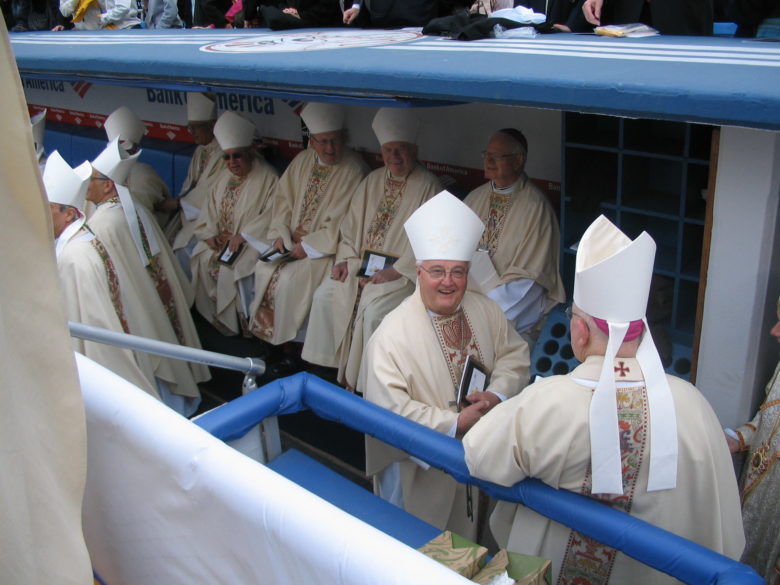
Bishop Latino spent most of his priesthood in the Houma area where he was much loved by parishioners. He became close with a couple of families, and they included him in most celebrations as well as on vacations and travels.
He spoke of several trips with the family and a couple of priest friends to Vail, Colorado and even St. Moritz for skiing adventures. Yes, he was a great skier.
On one such trip, Bishop recalled he was slaloming down an advanced run, when a young woman with less skills was crossing his path. To not run over her, he had to veer quickly and caught a toe. As he tumbled down the mountain, he heard their guide call out for him to hold on. In his practical manner, he yelled back “to what?!”
Bishop survived the fall with only a broken wrist, which was fitted for a cast by molding it around a ski pole so he could continue skiing for the duration of the trip.
When he was named a monsignor in 1983, the parish gave him a trip to Europe with two priest friends. The three-week trip began in Rome and made its way to Venice, Salzburg and ultimately Amsterdam.
Bishop told of the hotel in Venice being next to the opera house. The opera was not in season, but many of the artists would practice in the early evening. So, the three friends could purchase a bottle of wine, bread and cheese and have a mini concert each night with the hotel windows open.
Other travels took him to Mexico where he and his traveling brothers took in more opera with a performance of Rigoletto by the local opera company. Bishop remembered a man in the audience being so distraught over the death if Gilda that he started sobbing and screaming “Gilda” over and over. Bishop remarked later: “everyone knows Gilda dies in Rigoletto and that in most operas everyone dies at the end. That’s Opera!”
He fondly remembered a cross-country trip to the wine country in California where many of the winery heads knew his father who was in the wholesale liquor business. He and his traveling companions got special tours of the area.
When he became Bishop of Jackson in 2003, his first ad limina trip to Rome followed in December of 2004. This was the winter before Pope now St. John Paul II died in April 2005. Bishop along with Bishop William Houck and Msgr. Michael Flannery, vicar general at the time, had a private audience with the pontiff. Bishop had 15 minutes alone with the future saint.
In 2006, the Diocese sponsored a tour to Rome and Assisi for the 500th anniversary of the Vatican Museum collections. Bishop Latino led the tour and celebrated Mass for the pilgrims in the four major basilicas of the church and in the church where St. Francis is buried.
There were two more trips to Rome for Bishop Latino before his retirement. In 2008, he and Bishop Houck went for the pallium ceremony on June 29, for Archbishop Thomas Rodi of Mobile. A pallium is a special vestment worn around the neck by archbishops. The wool used to make the vestment is placed over the bones of St. Peter beneath the main altar of St. Peter Basilica.
The final trip to Rome was in February 2012 for an ad limina with Pope Benedict XVI. At the end of the trip, we added four days in Sicily. Bishop was able to visit his ancestral home and celebrate Mass in the church of his grandparents. It was a spiritual pilgrimage for him, and he came away energized and happy.
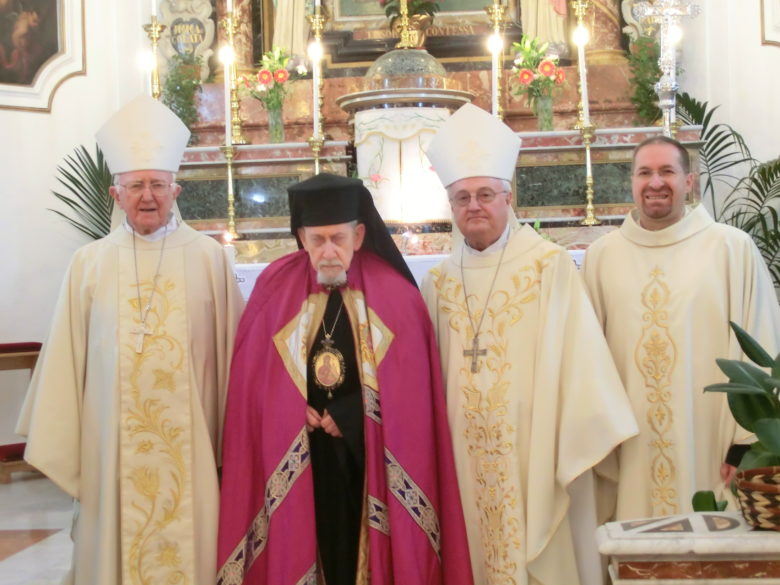
In his retirement years, his travels were confined mainly to priest anniversaries and funerals. He kept a low profile while maintaining a strong spiritual connection to the diocesan church and the flock through prayer.
His last journey began the morning of May 27 and concluded in the early morning hours of May 28. Unlike his other travels shared with friends, he made this journey alone – although I imagine there was a large gathering of souls waiting to greet him at his final destination. Rest in peace, +Joseph.
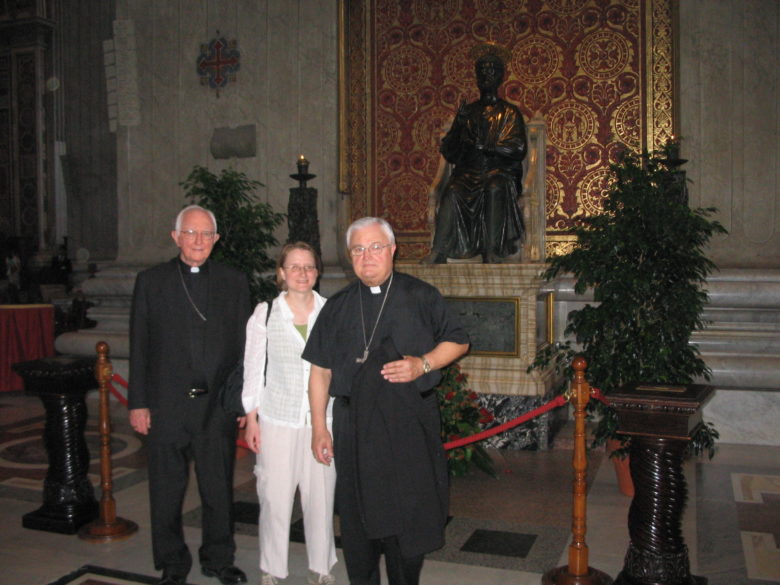
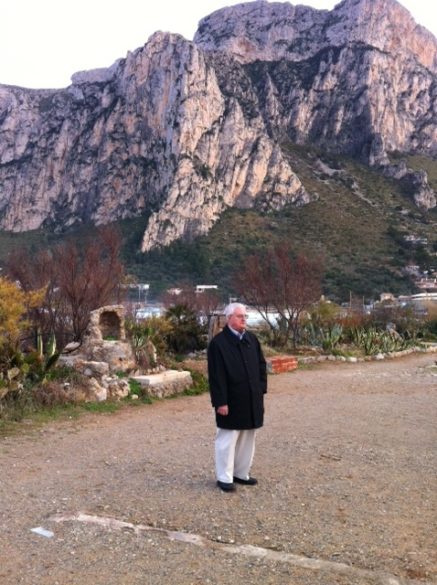
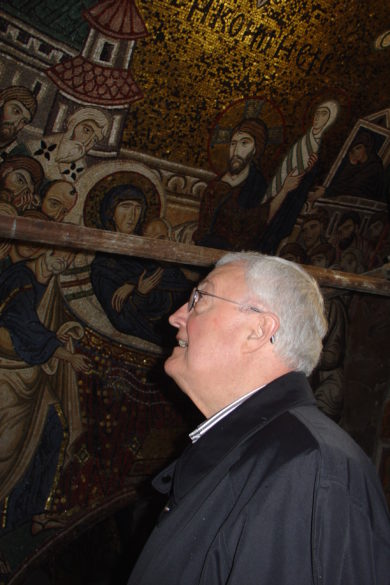
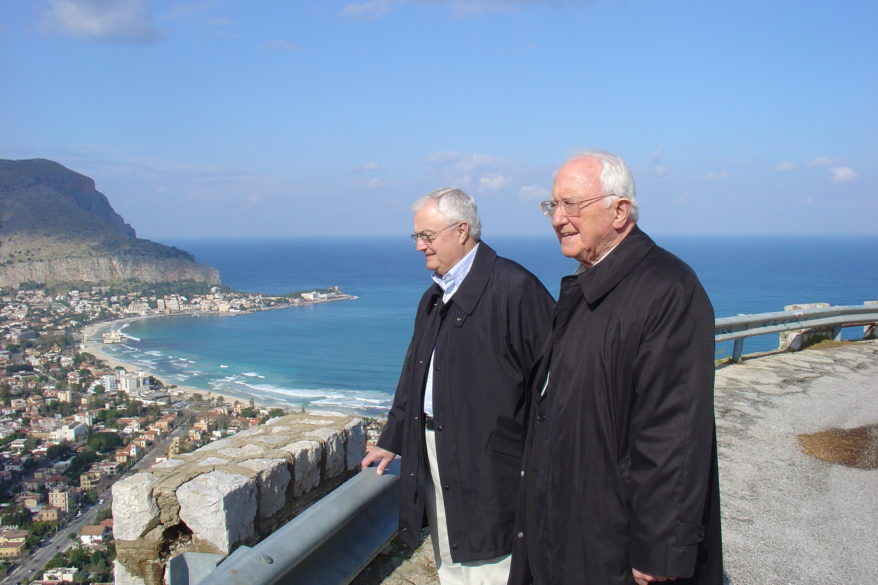
Houma-Thibodaux remembers Bishop Latino
By Janet Marcel, Bayou Catholic
HOUMA, La. – Bishop Emeritus Joseph Nunzio Latino, who served as the 10th Bishop of Jackson, died Friday, May 28, at the age of 83. The New Orleans native attended St. Joseph Seminary College in St. Benedict and Notre Dame Seminary in New Orleans, and was ordained a priest for the Archdiocese of New Orleans by Archbishop John Cody in St. Louis Cathedral May 25, 1963.
During his priesthood, Bishop Latino served in parishes in New Orleans, Metairie, Houma and Thibodaux. When the Diocese of Houma-Thibodaux was established in 1977, he was serving as pastor of St. Bernadette Church in Houma, where he remained until 1987. Under his leadership, St. Bernadette became the largest parish in the newly established diocese, not only in size but also in the number and variety of services and ministries it offered.
In 1983, Pope John Paul II named him a Prelate of Honor with the title of monsignor.
He was appointed pastor of the Cathedral of St. Francis de Sales in Houma in 1987 and served there until 2003.
At the diocesan level in Houma-Thibodaux, Bishop Latino served as defender of the bond, dean, consultor, fiscal officer, chancellor and vicar general. Bishop Latino was elected as diocesan administrator on Dec. 19, 2002, after Bishop Michael Jarrell, Second Bishop of Houma-Thibodaux, was appointed as the Sixth Bishop of the Diocese of Lafayette. Just a few short weeks later at a press conference on Jan. 11, 2003, the announcement was made that then Msgr. Latino had been appointed the 10th Bishop of the Diocese of Jackson. He was ordained a bishop and installed March 7, 2003, in the Cathedral of St. Peter the Apostle in Jackson.
Bishop Latino devoted his ministry as bishop to fostering Gospel-based social justice initiatives, lay leadership and vocations. While he was bishop, the office for Protection of Children was established to help ensure a safe environment for children in church parishes, schools and communities. Under his leadership the church implemented the new English translation of the Roman Missal.
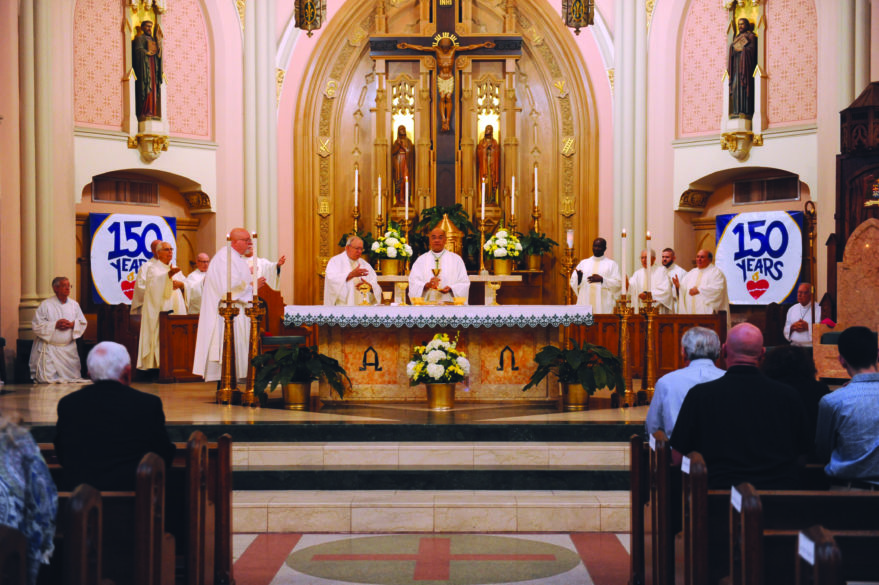
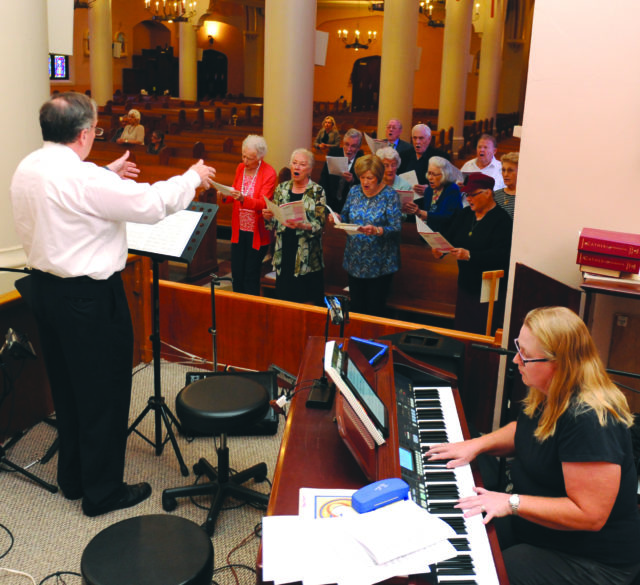
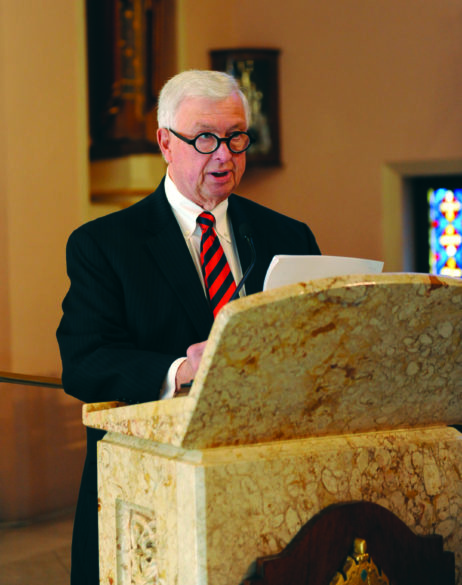
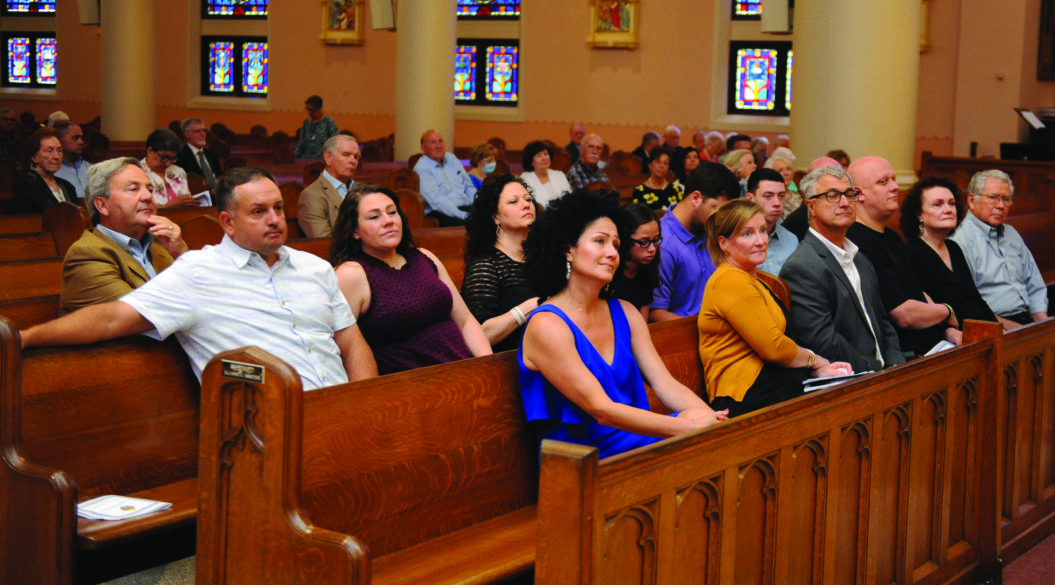
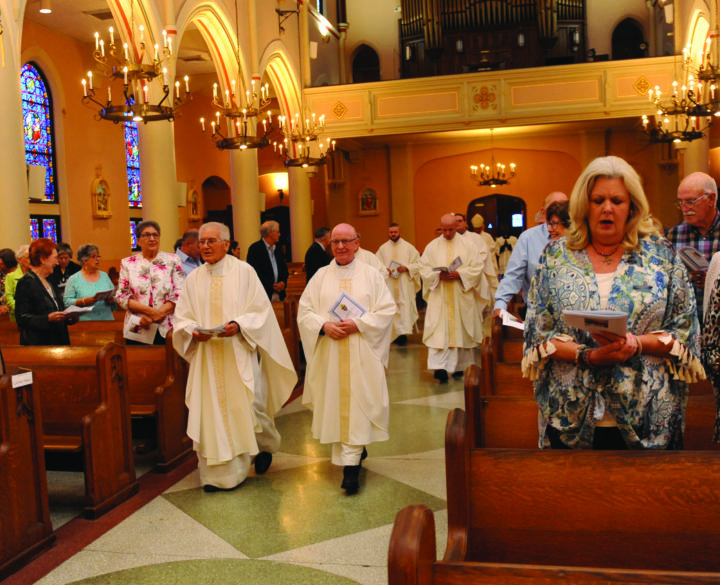
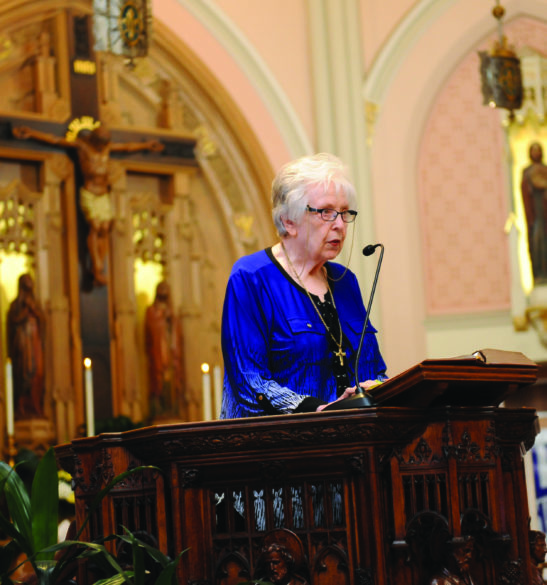
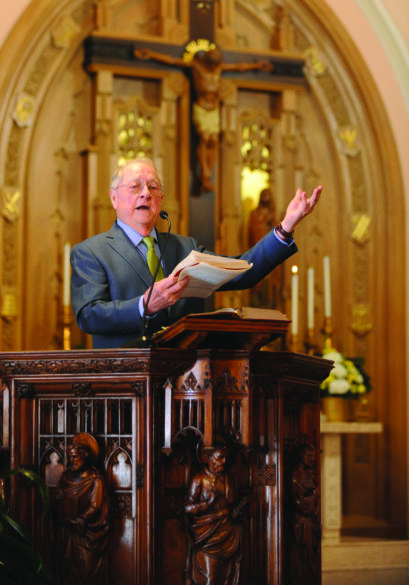
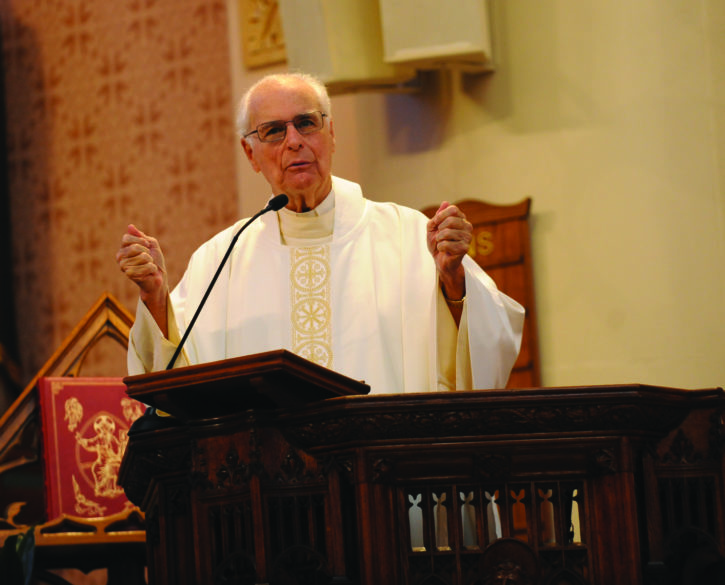
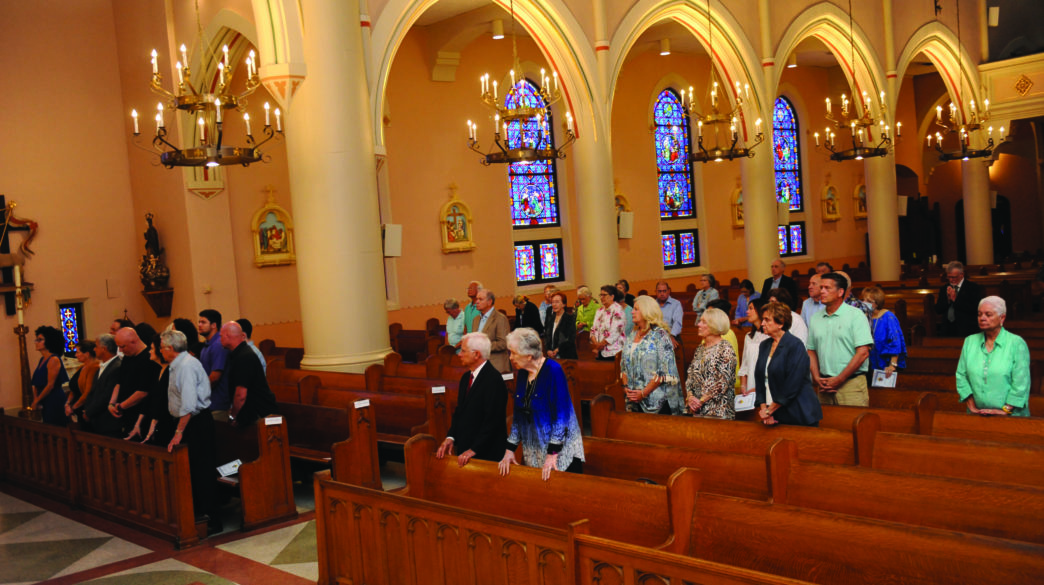
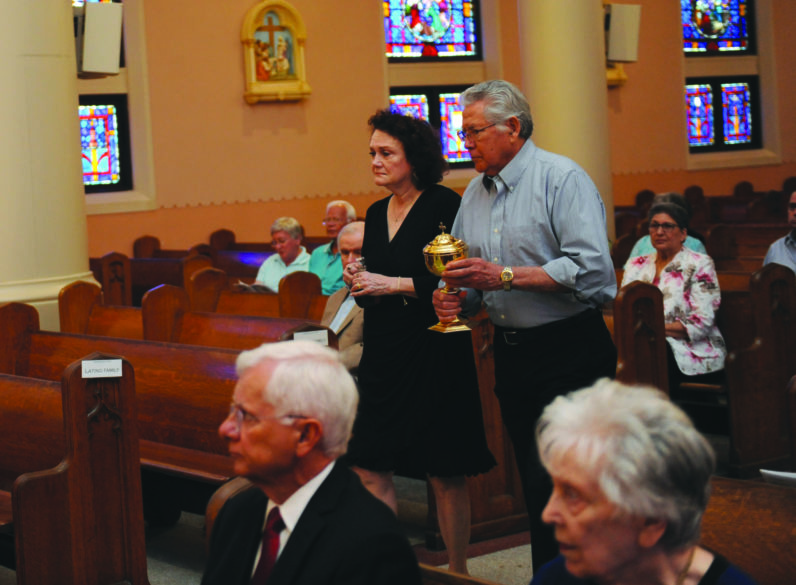
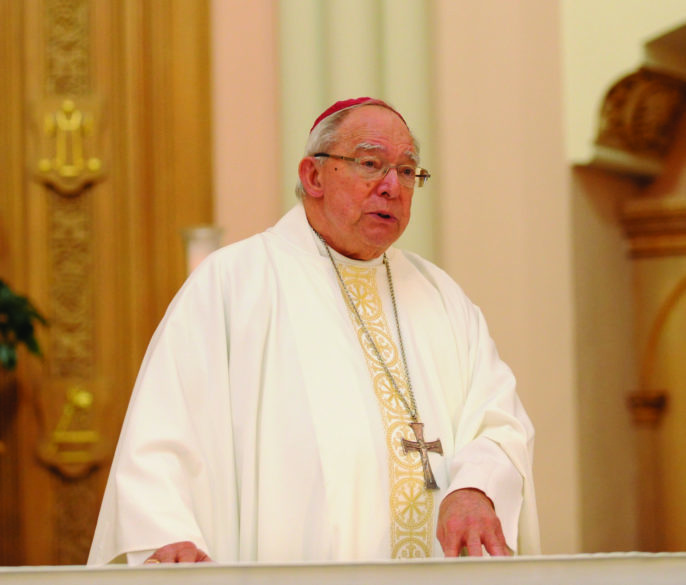
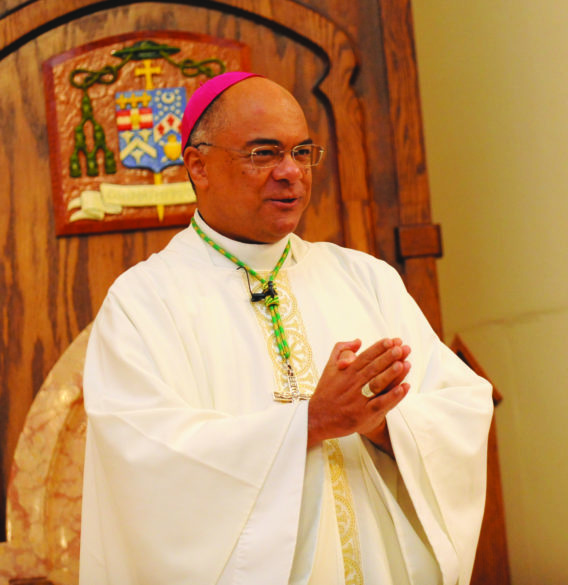
He retired from active ministry Dec. 12, 2013. In his retirement he continued to minister through quiet prayer and reflection, sharing the wisdom he gained during his 59 years of priestly service and 83 years of life in Christ.
The following is an excerpt from a story written by Louis Aguirre that appeared in the Oct. 19, 1988, issue of the Bayou Catholic newspaper.
Msgr. Latino, who served the Diocese of Houma-Thibodaux as director of the Office of Vocations from 1980 to 1985, can’t help but point out the key elements which led to his vocation – elements which he believes are greatly responsible for influencing others: The example of a priest, the influence of teachers and the love and encouragement of his family.
“The priest I so much admired as a young altar boy was great with kids, says Msgr. Latino. “I remember he took us on a picnic at St. Joseph Seminary. When I saw the place, I knew I wanted to return to study for the priesthood there.” The monsignor says he was greatly influenced by the happiness, excitement and vigor which the priest exuded.
Also influencing his decision were the Mount Carmel Sisters who taught at St. James Major. “They made me think about my vocation and guided me in the right path,” says Msgr. Latino.
Equally important in fostering a vocation for Msgr. Latino was the example set by his parents and family. “My family is very religious,” he says, “and they encouraged me to be a responsible altar boy. There is no doubt for me that my family had a strong influence in my vocation … not by forcing it, but by encouraging it.”
Msgr. Donald Ledet, retired priest of the Diocese of Houma-Thibodaux who was ordained to the priesthood the same day as Bishop Latino, says he was very active and talented. “Bishop Latino was the kind of guy that everybody wanted to have as a friend. He liked to enjoy life; he joked and played around a lot, but when it was time to get serious, he could do that, too. For most of his priestly life, Bishop Latino was close to the ‘power,’ the bishop and the operations of the diocese. He was a very capable man, active at the Pastoral Center, and he served in many leadership roles.”
Jerome Daigle, longtime parishioner of the Cathedral of St. Francis de Sales in Houma and personal friend of Bishop Latino, says he attended St. Joseph Seminary for four years of high school and one year of college with Bishop Latino from 1951 until 1956.
One special memory he has is of Bishop Latino baptizing his second daughter while he was serving as associate pastor at St. Francis de Sales parish in Houma from 1963-1968.
Daigle says as his pastor, Bishop Latino was very open to suggestions from his parishioners. Daigle was a member of the finance council when the cathedral was being renovated, and he recalls Bishop Latino working very well with the members of the council.
“He was very loved by the faithful. I remember that he had a strong devotion to Mary, and he was very committed to saving the unborn. He was a very good friend. He had a great sense of humor. My family and I felt very comfortable when we were with him. We had him over occasionally for dinner and to visit. He was very much a family man … was always close to his own family.”
Msgr. Frederic Brunet, retired priest of the Diocese of Houma-Thibodaux, says he and Bishop Latino met for the first time at St. Joseph Seminary College in Covington, when Bishop Latino entered at the age of 14 in 1951. At that time, Msgr. Brunet was 17 years old and beginning his third year of study. “We just liked each other from the start and that was beginning of a lifelong friendship,” says Msgr. Brunet. “We did all kinds of things together at St. Ben’s and then at Notre Dame Seminary. We even went on vacations together with other seminarians.”
They were assigned to teach together at St. John Prep High School Seminary in St. Teresa parish in New Orleans for about 5-6 years. They were also in charge of the boarding students there.
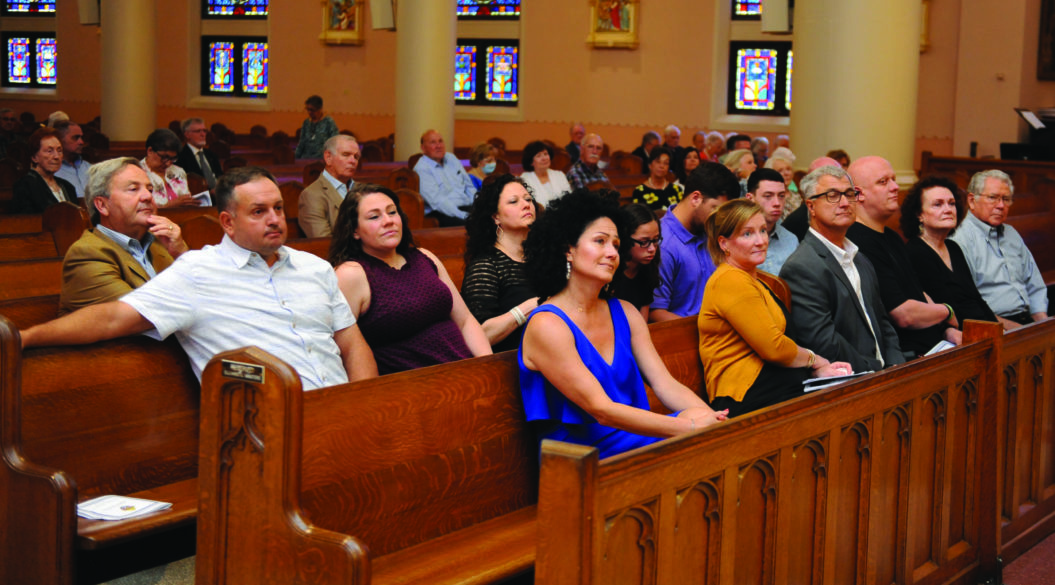
When the Diocese of Houma-Thibodaux was being established, Bishop Warren L. Boudreaux, its first bishop, formed a committee to make decisions about things like who was going to be the vicar general, chancellor, vicars forane, what different departments and offices were needed, etc. The committee consisted of Msgr. Brunet, Bishop Latino, Msgr. Francis Amedee, Msgr. John Newfield, Msgr. William Koninkx, Msgr. James Songy and Msgr. Albert Bergeron. Msgr. Brunet says it was an interesting and fun adventure working alongside Bishop Latino, and the others, during the formative years of the diocese.
In addition to working on various committees together through the years, sometimes the two pastors would get together after their day’s work was done and go out for pizza, and for many years they played golf together at least once a week.
“Joe was a great friend and a wonderful priest. He would help anyone any way he could. He was just a wonderful person … warm, kind, gentle and helpful. He had a good sense of humor, was a great storyteller and loved to entertain others. He had a way of bringing people together. His episcopal motto, ‘That All May Be One,’ was perfect because that’s the kind of person he was.”
Msgr. Brunet says of Bishop Latino, “There was one thing you always knew for sure about him … maybe you could doubt whether he was right or wrong about something, but … there was no doubt about his integrity, his sincerity and his dedication to the truth.”
(Printed with permission of Bayou Catholic, magazine of the Diocese of Houma-Thibodaux)
